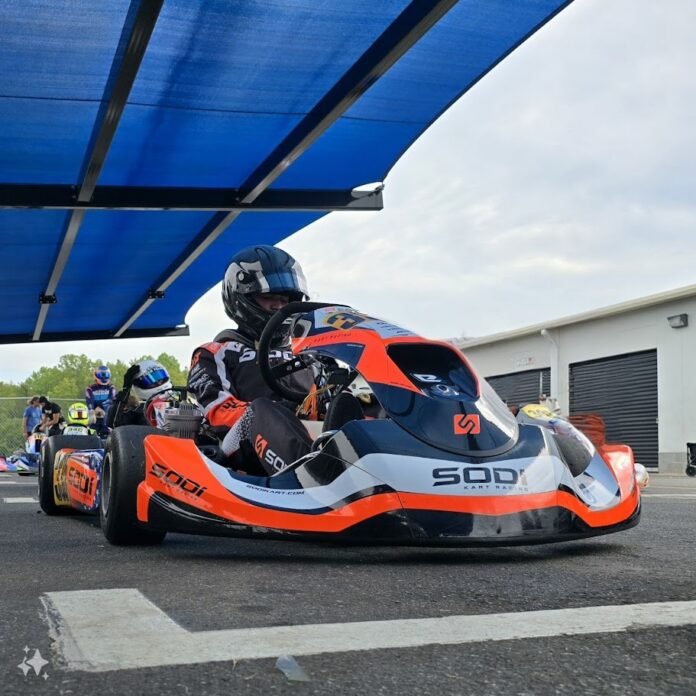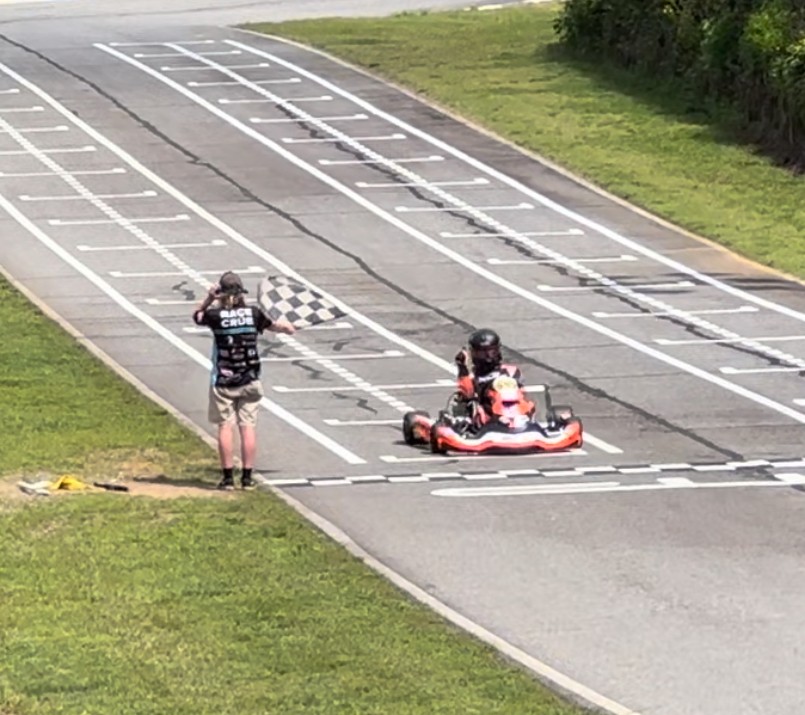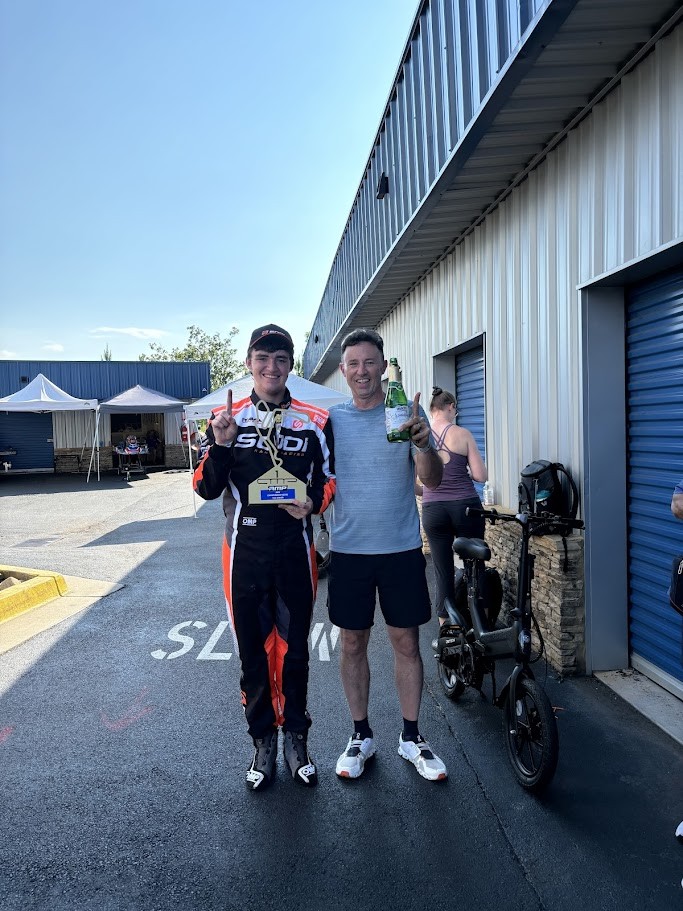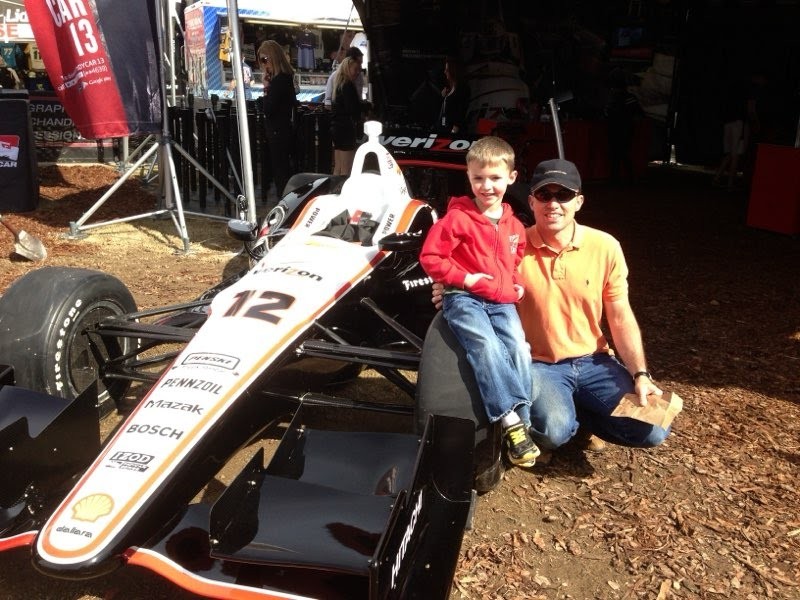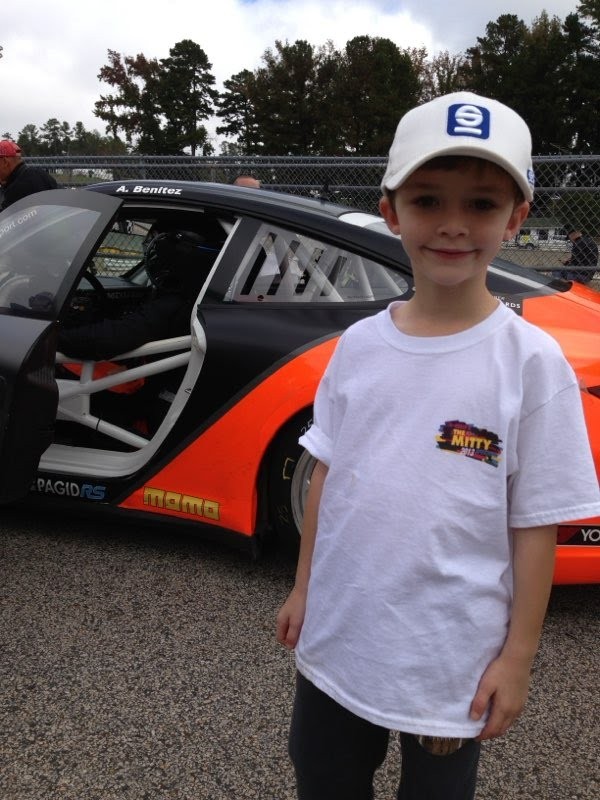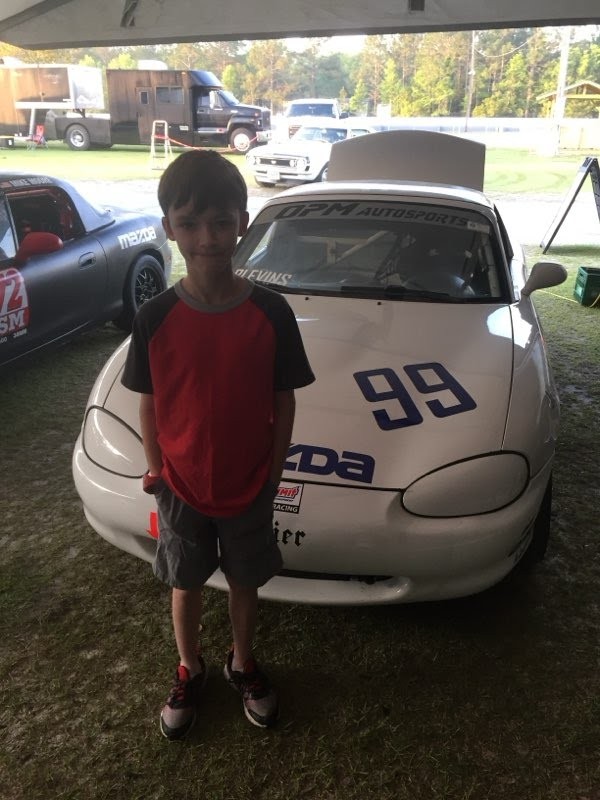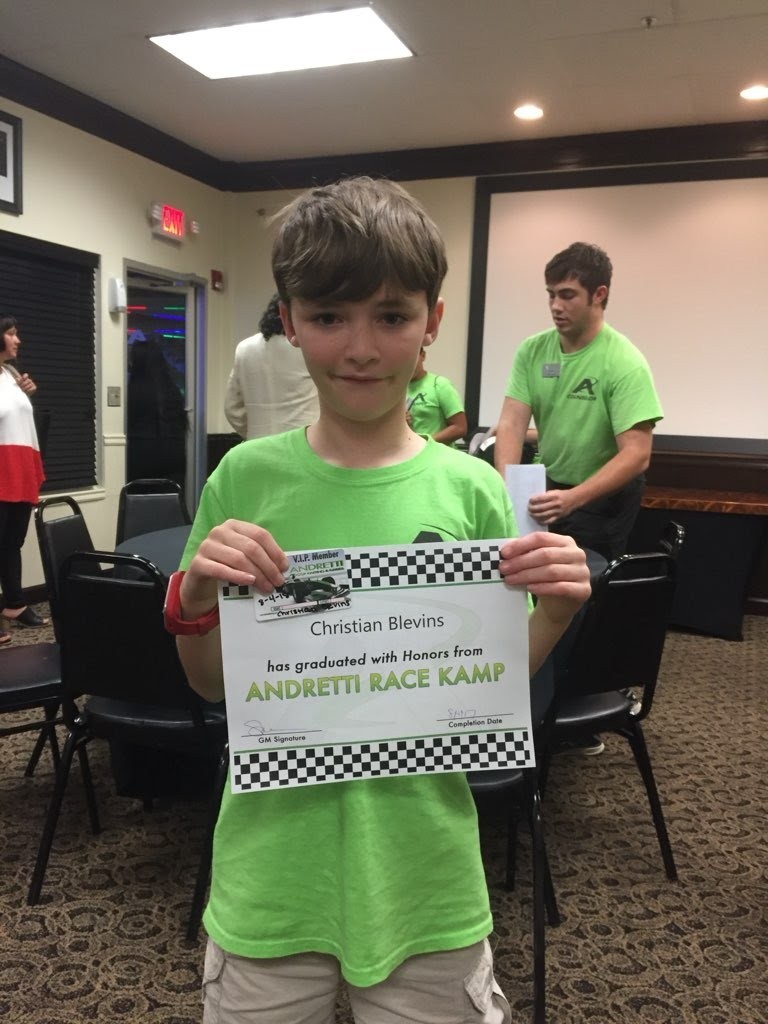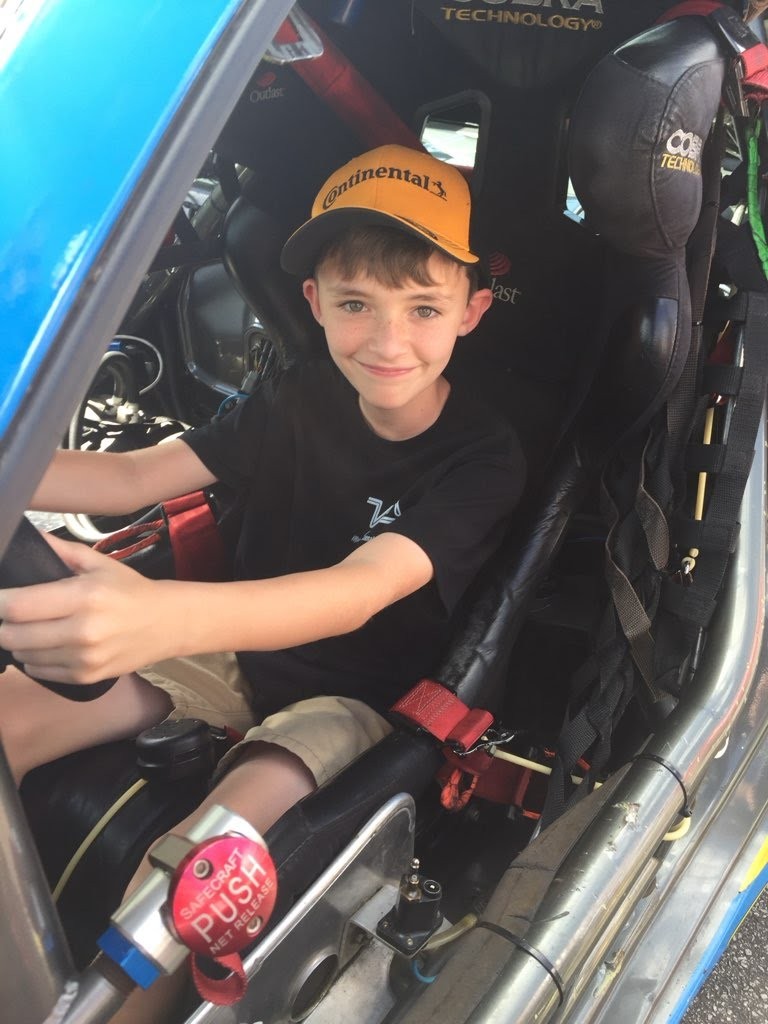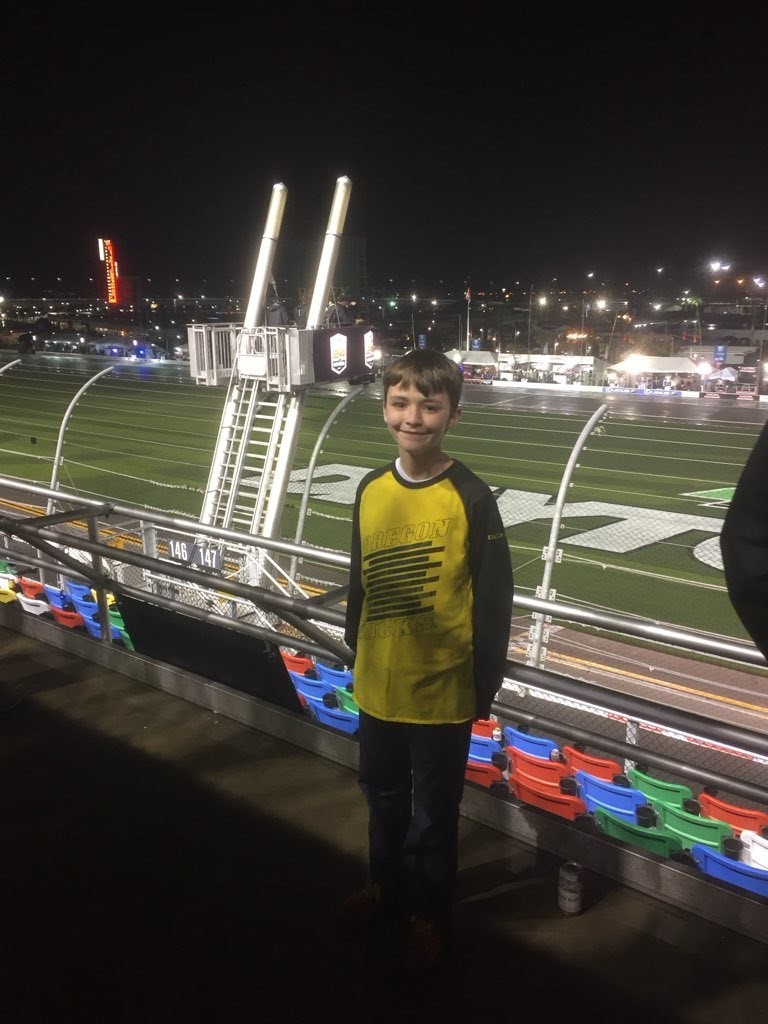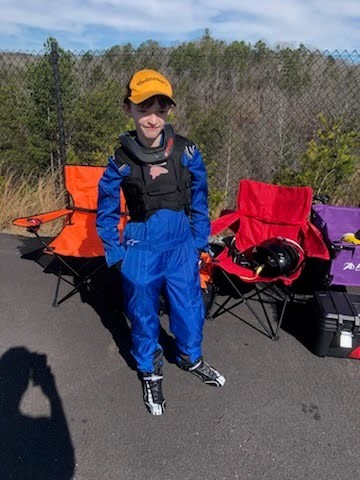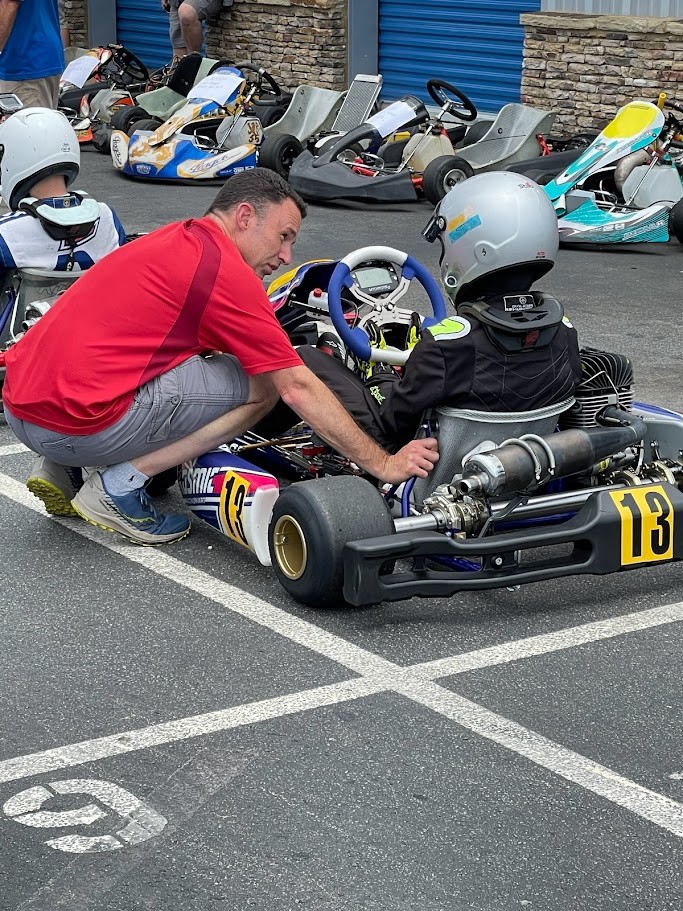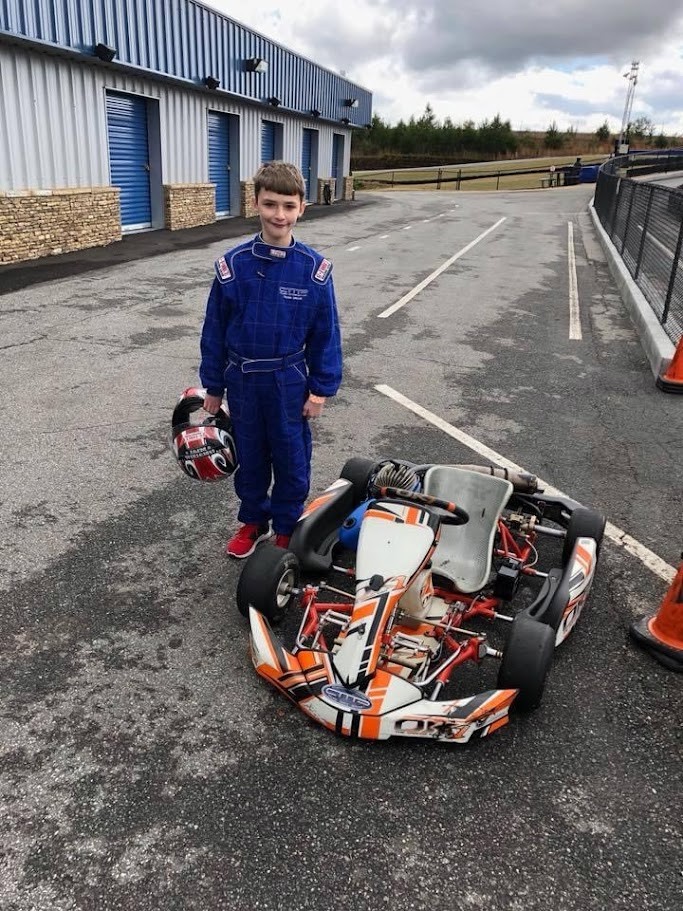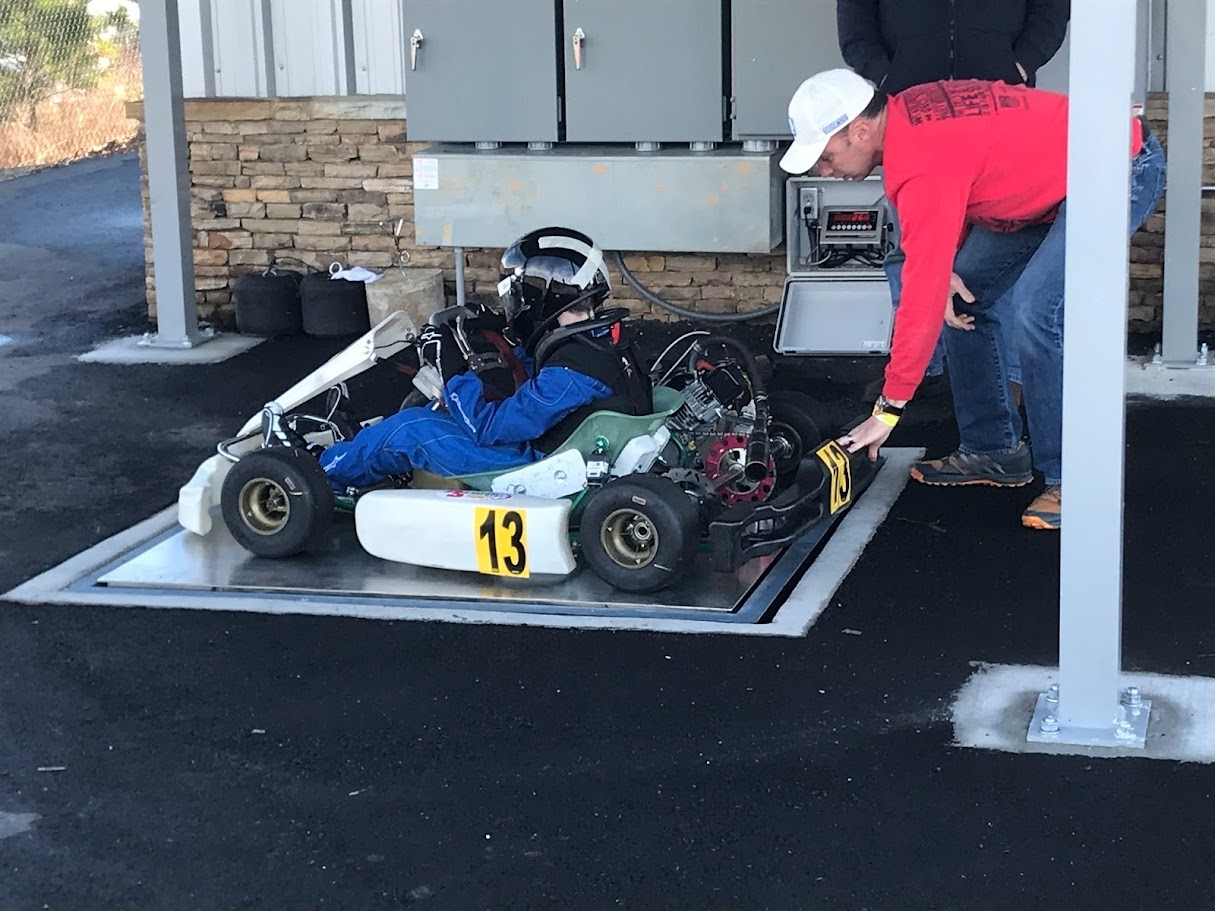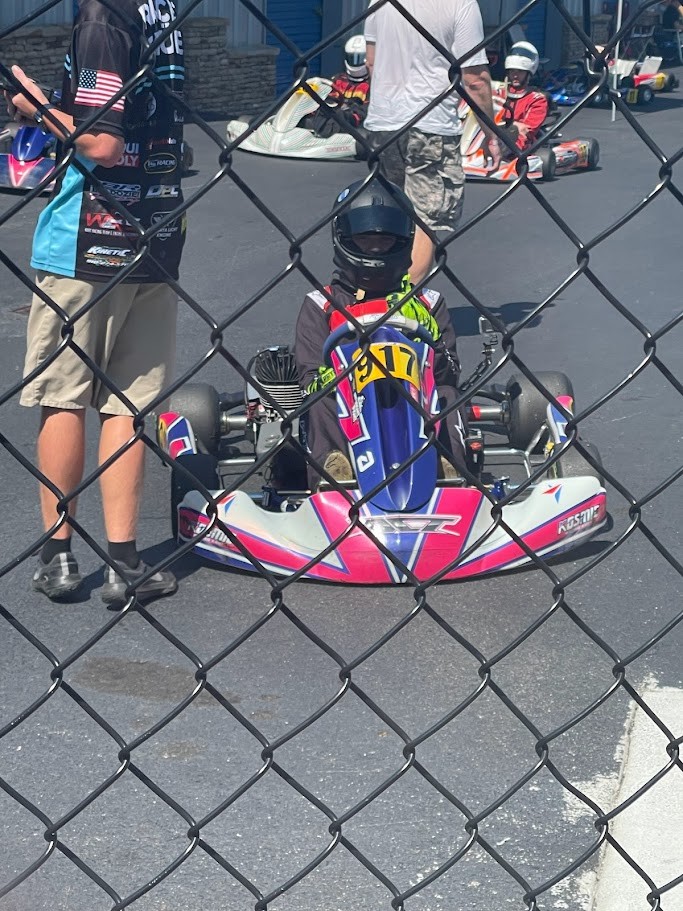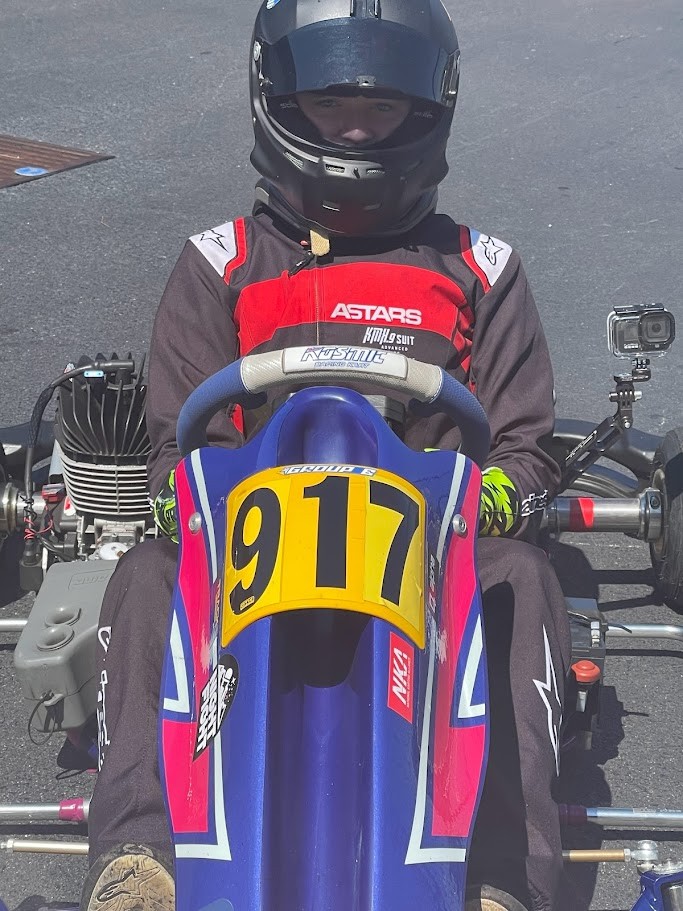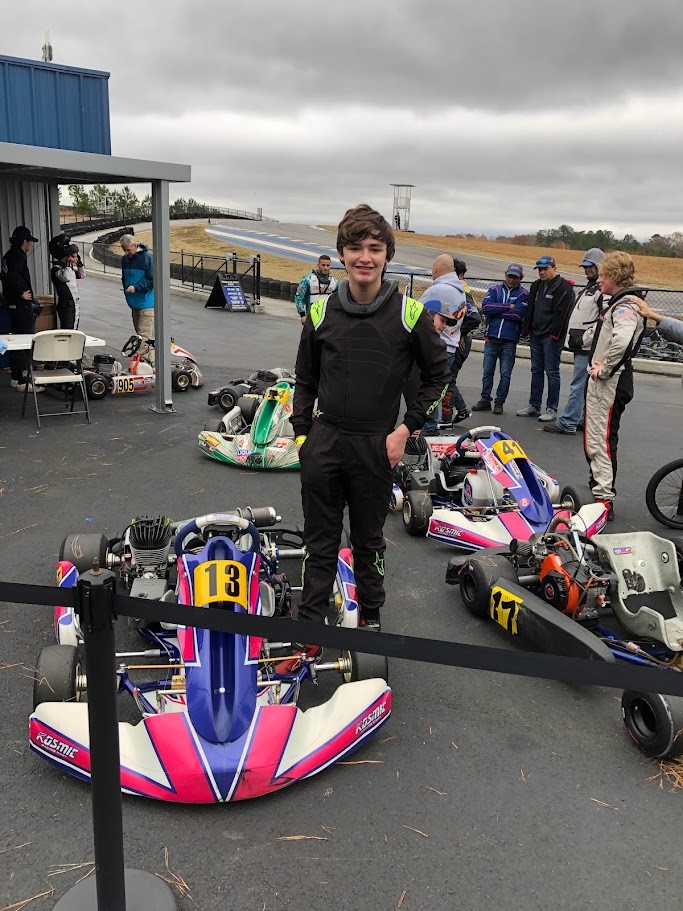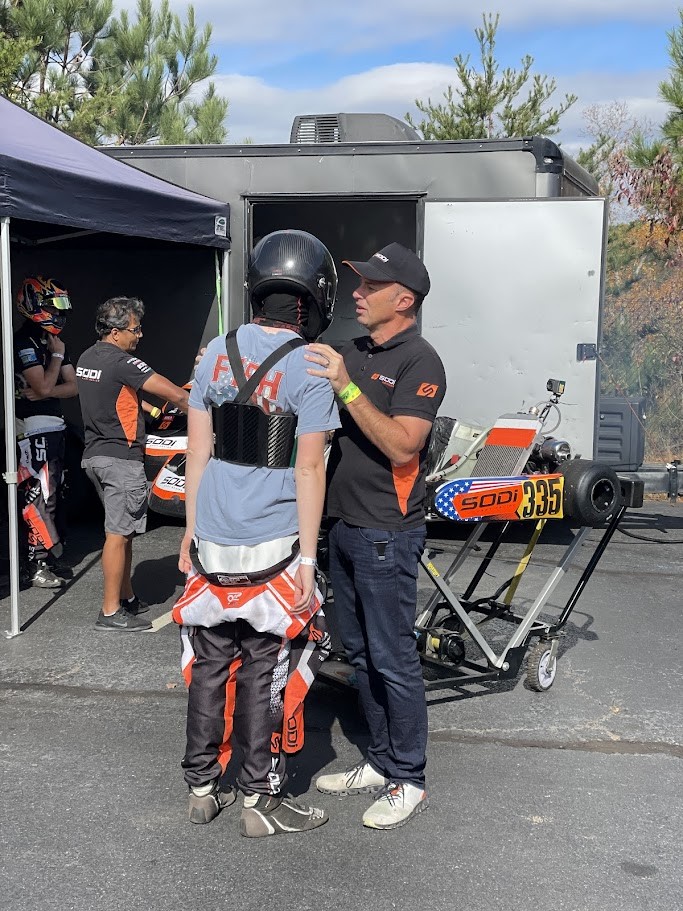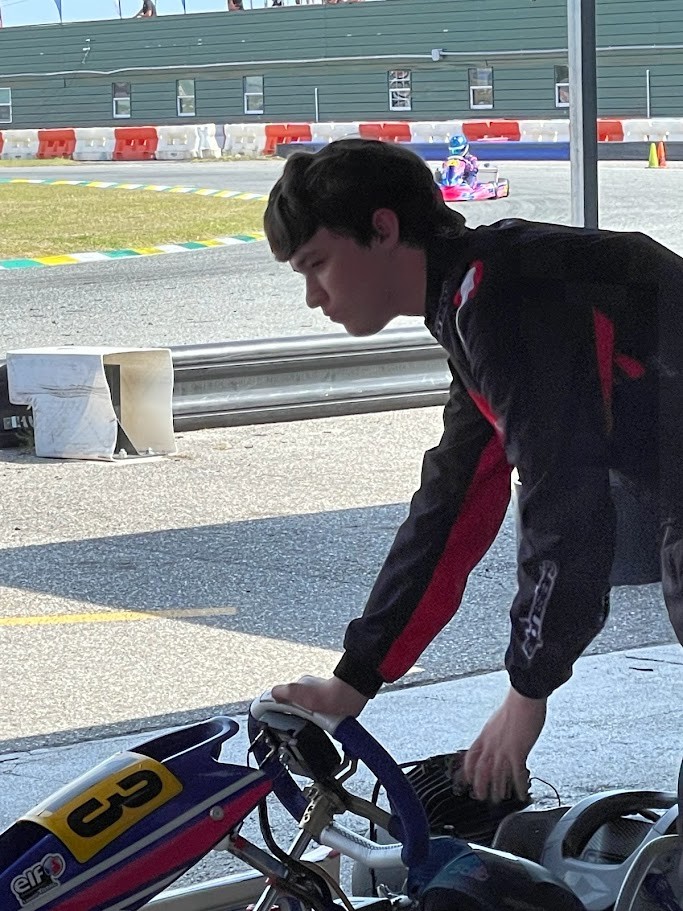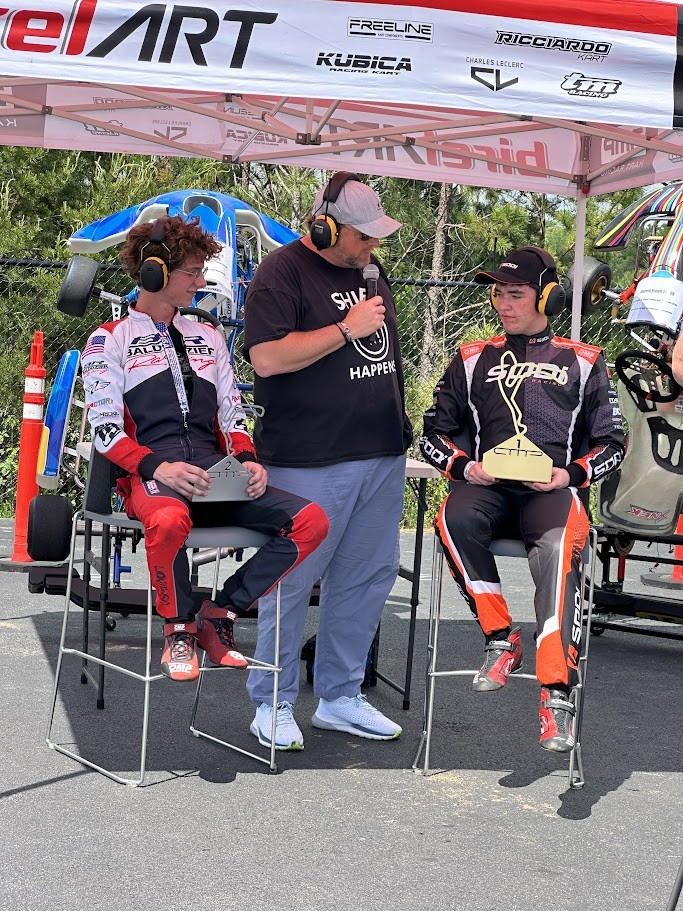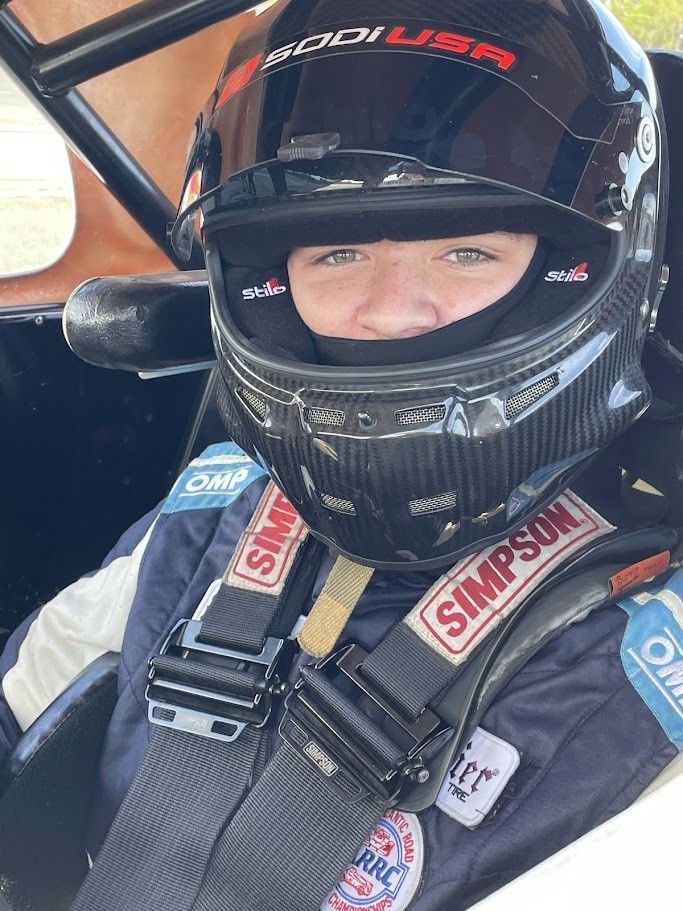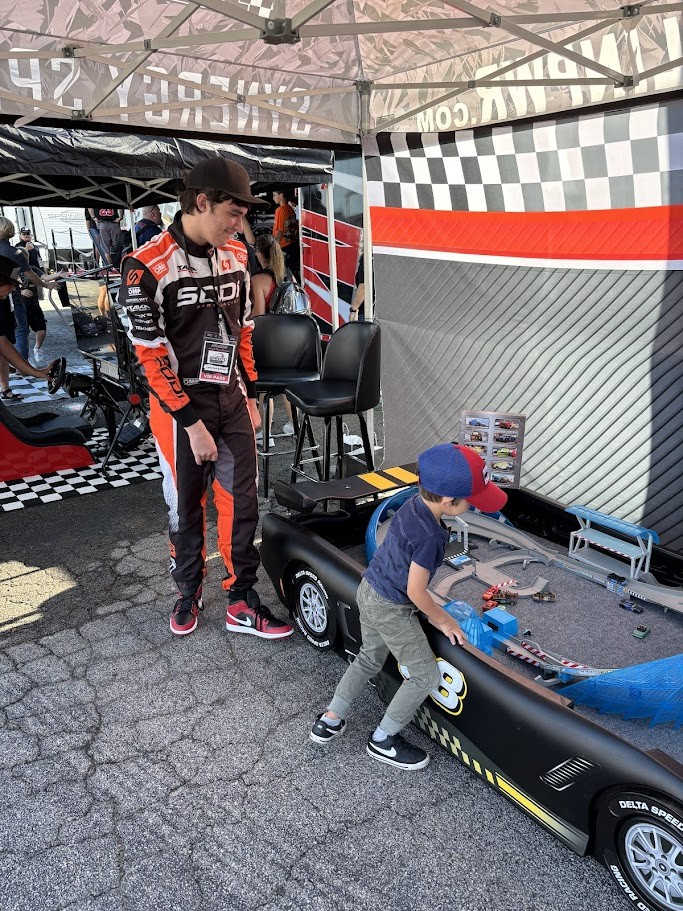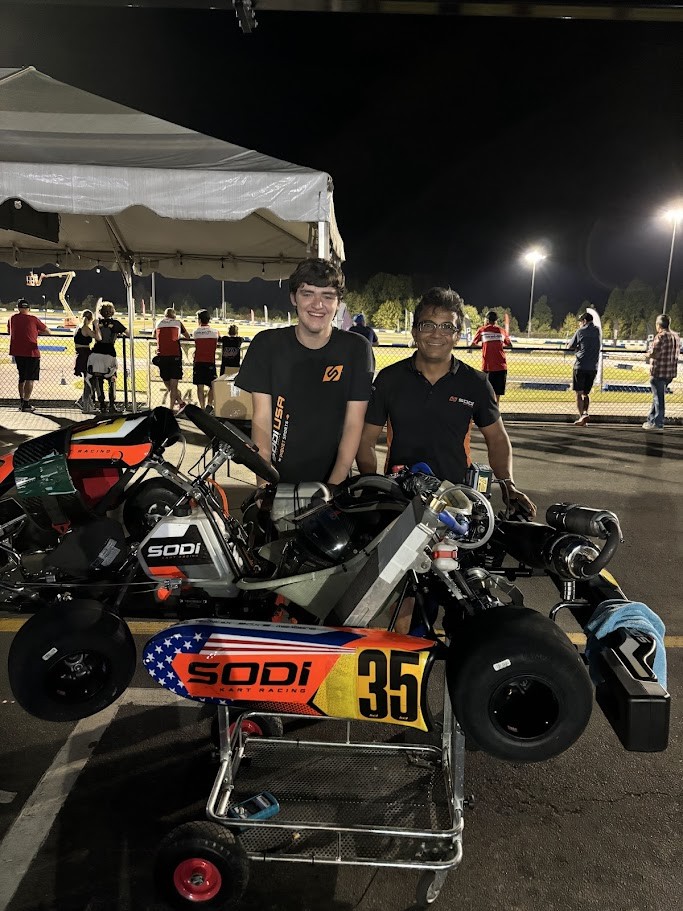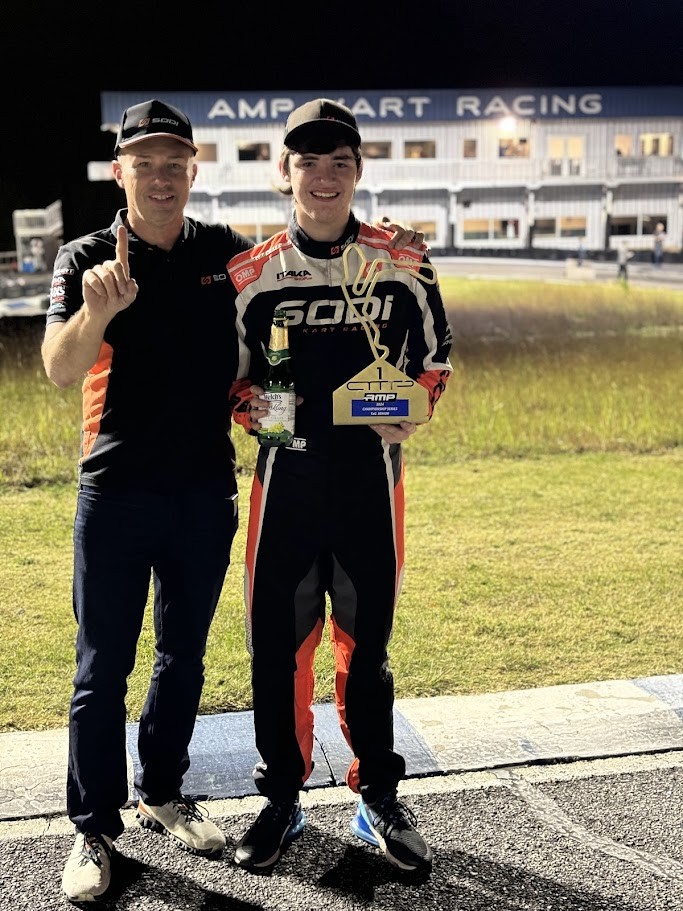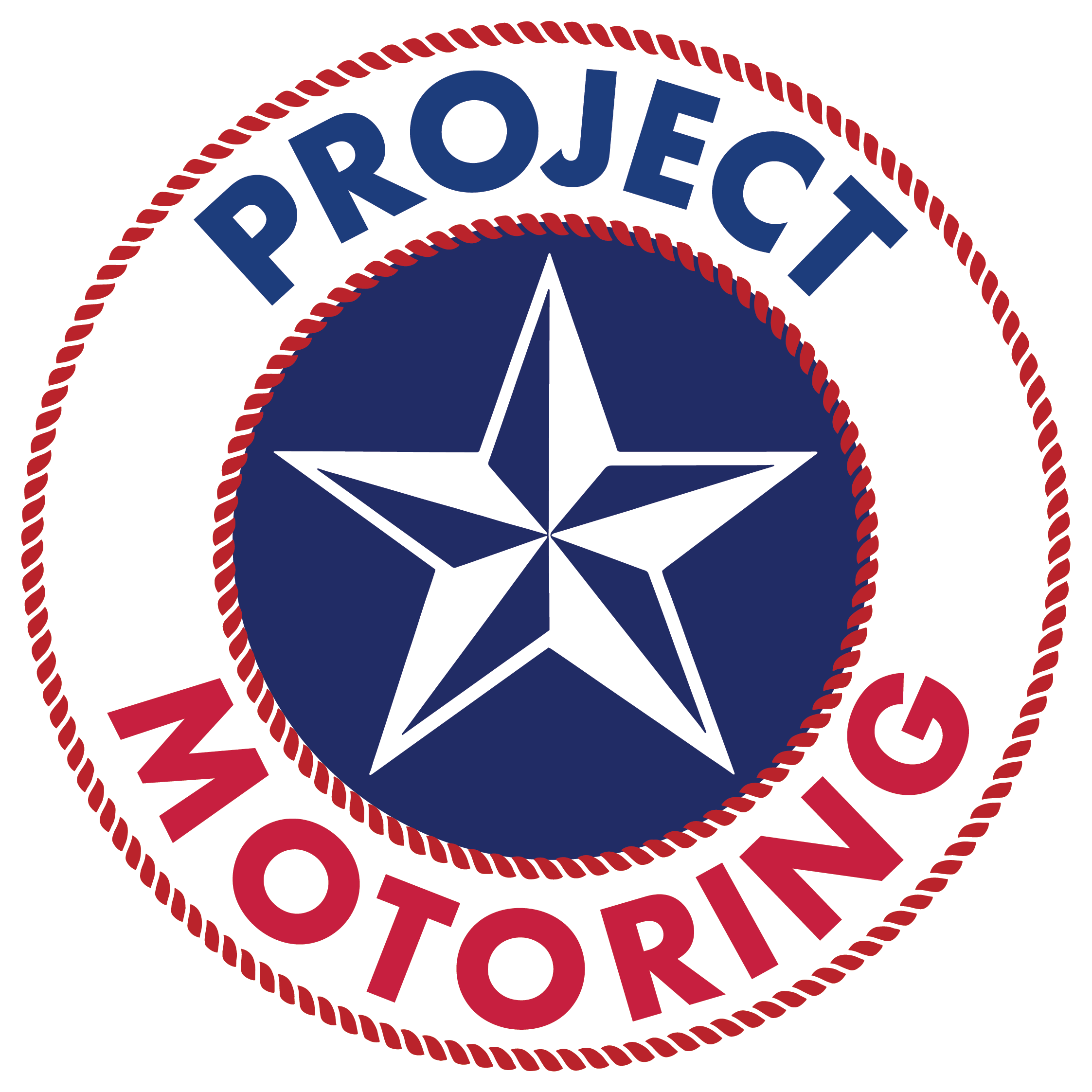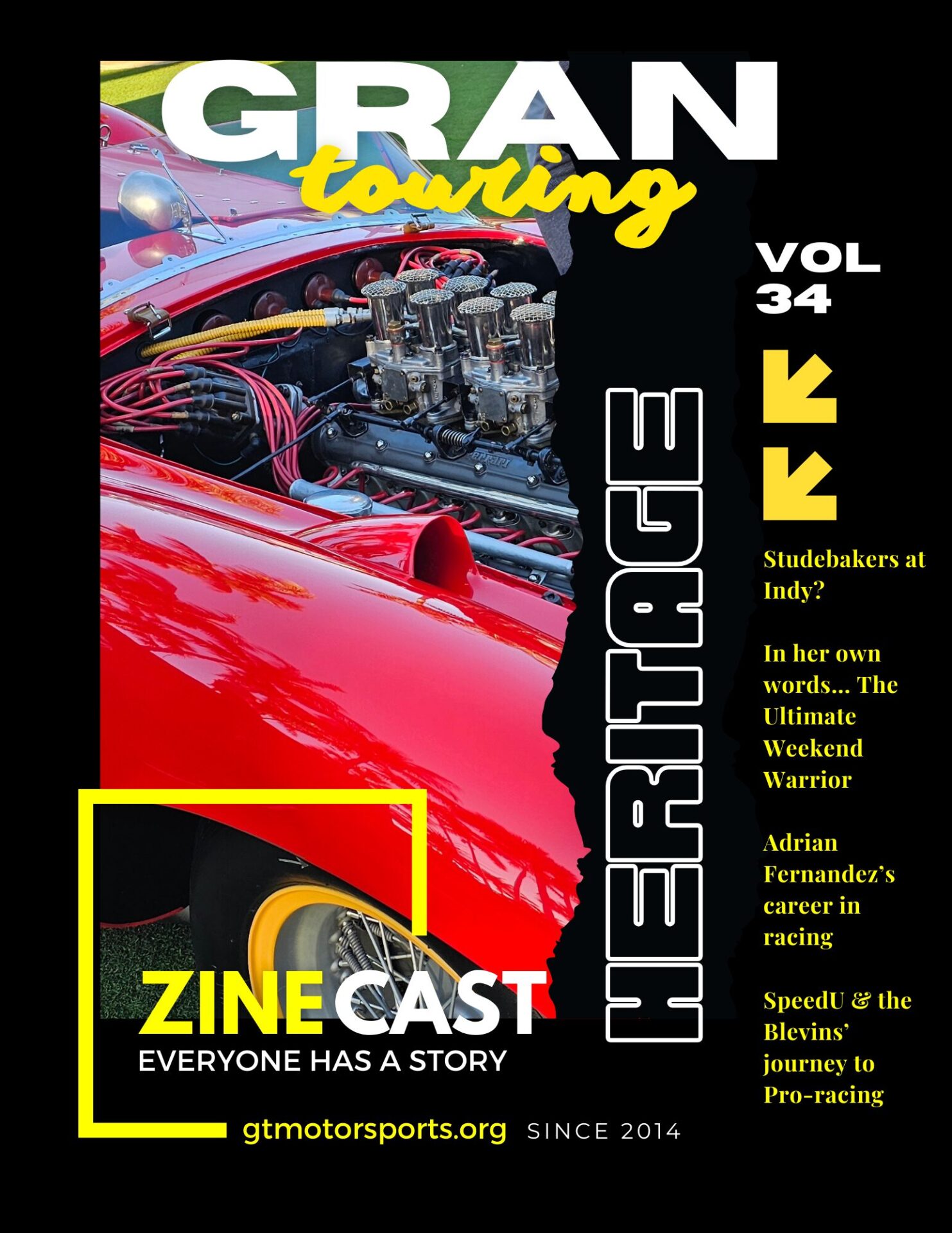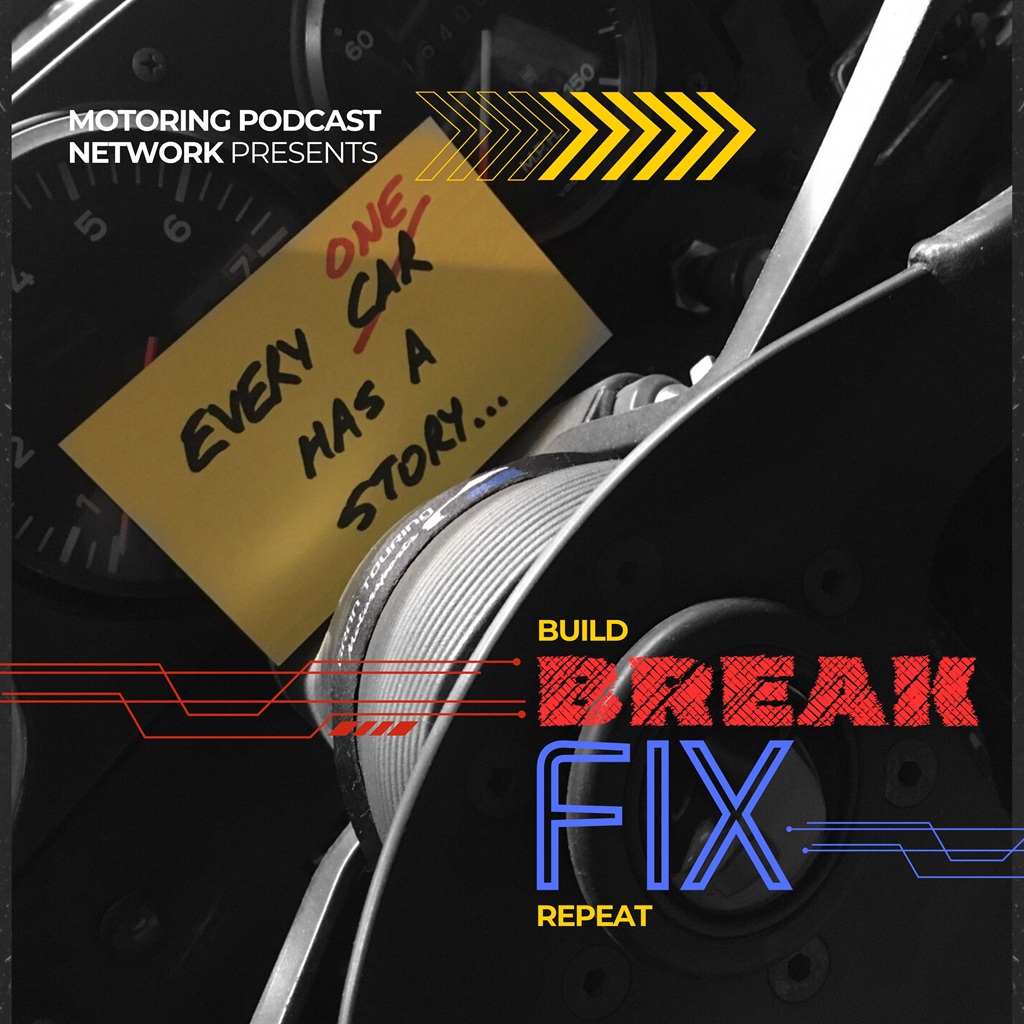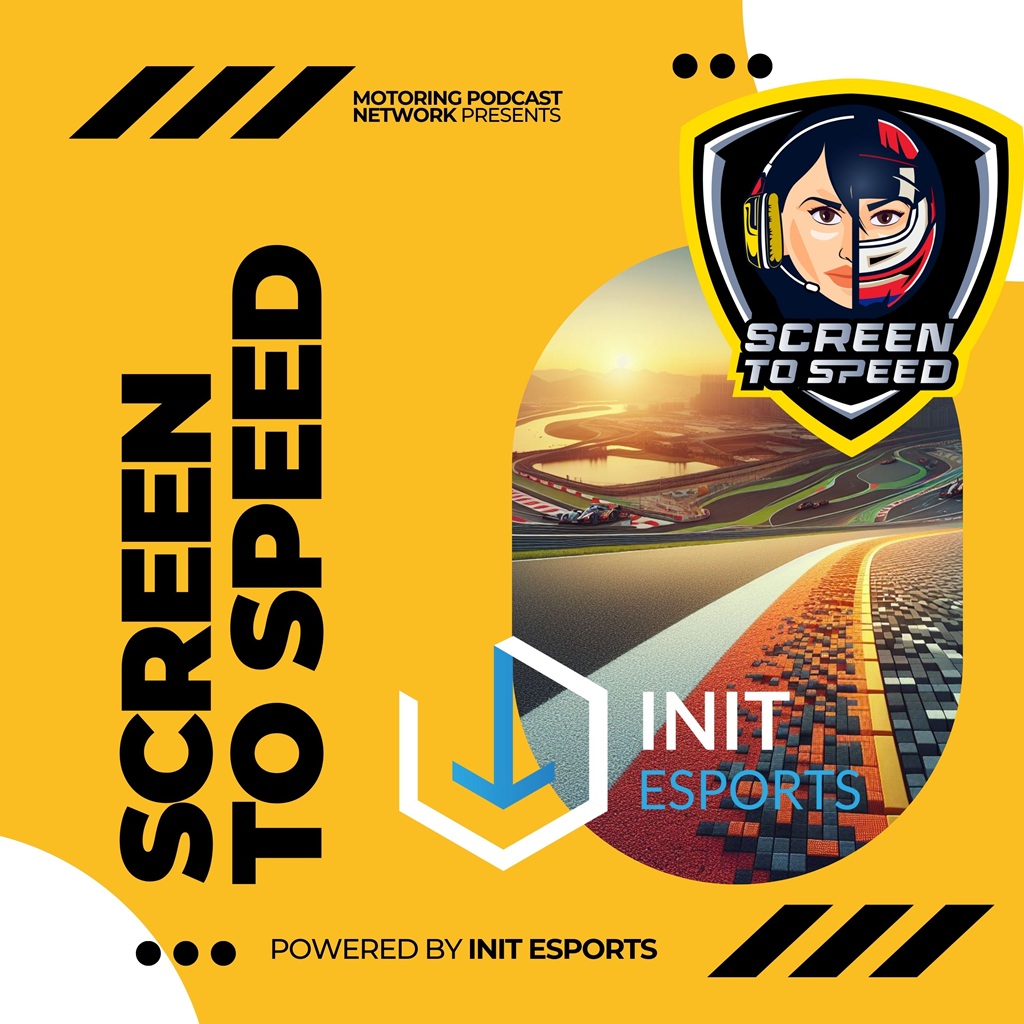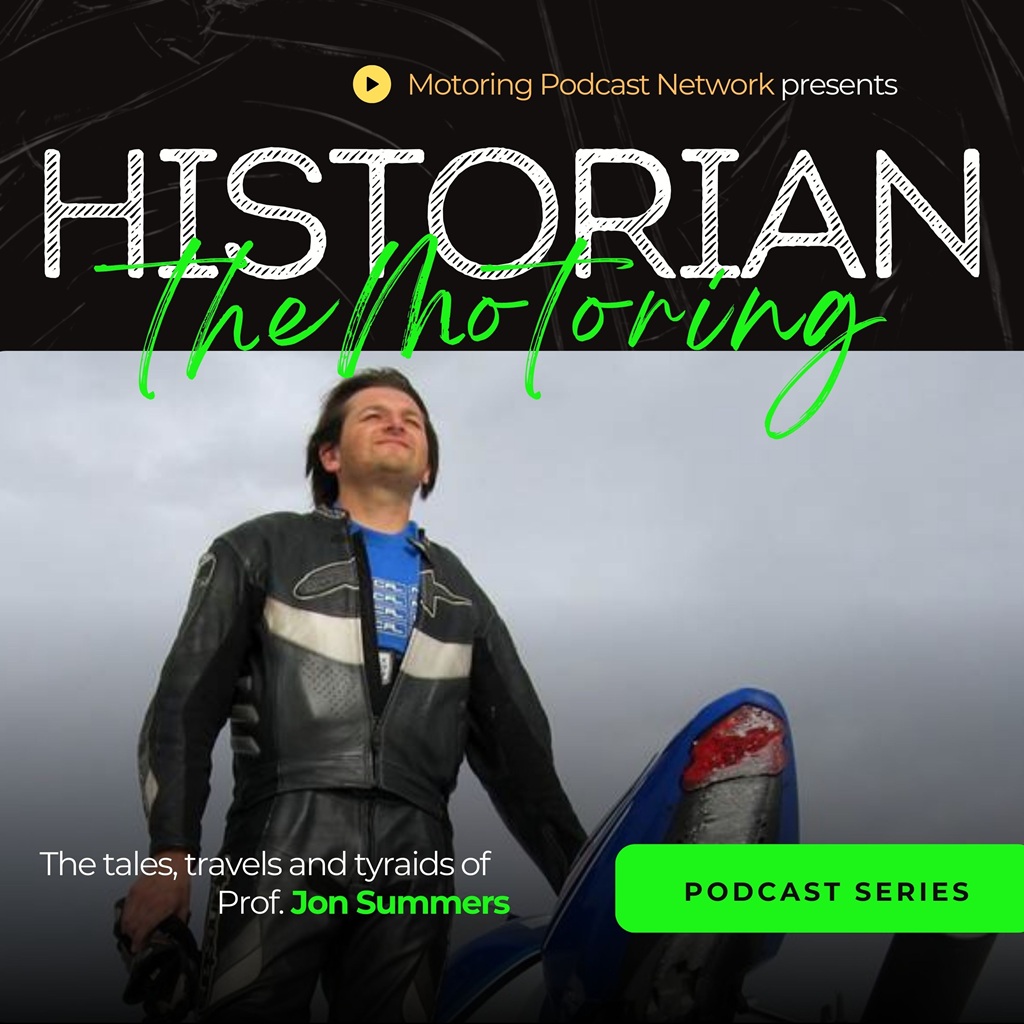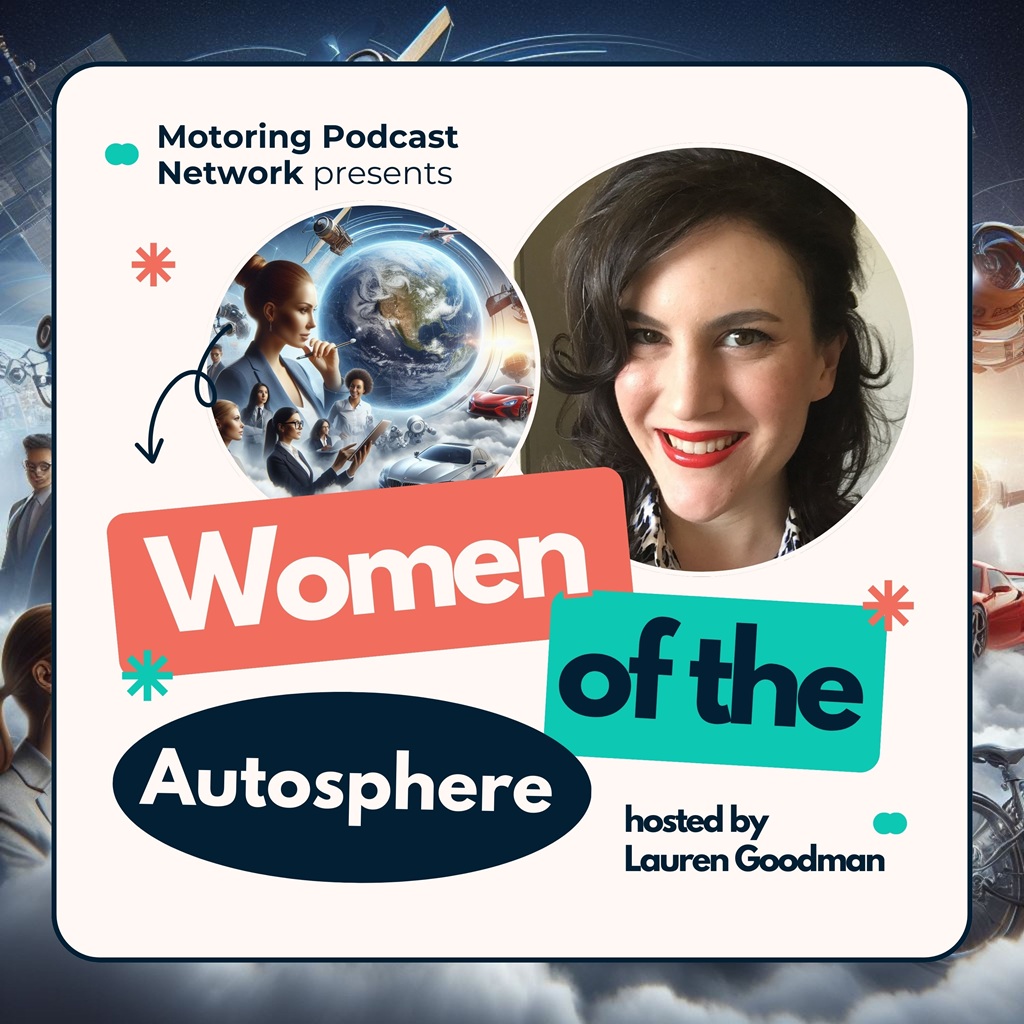We’re diving into the high-octane world of racing with a young driver who’s redefining what it means to chase a dream. Meet Christian Blevins Jr—a rising star in the racing world who’s leaving traditional classrooms in the dust to focus on one thing: becoming the best behind the wheel. Instead of textbooks and lockers, Christian’s education happens at Speed U, an elite racing-focused program that’s built for athletes like him—drivers who live life in the fast lane, both on and off the track.
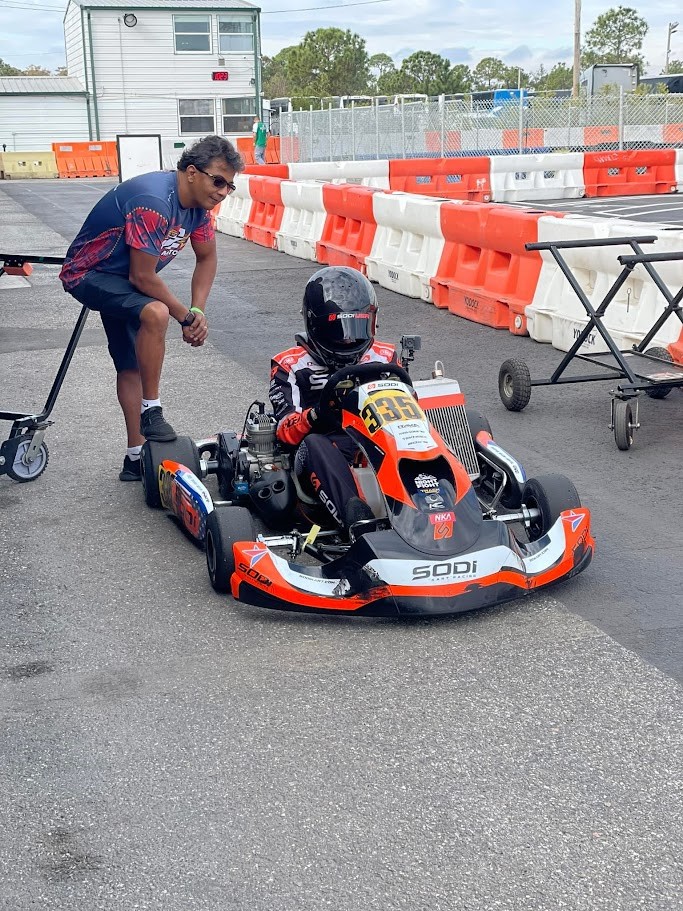
We’ll follow Christian’s journey, from training sessions to race day, the challenges of balancing school and sport, and what it really takes to become a champion in the making. Whether you’re a racing fan, an aspiring athlete, or just someone who loves a good underdog story—strap in, because this ride is just getting started!
Tune in everywhere you stream, download or listen!
 |  |  |
- Spotlight
- Notes
- Transcript
- Highlights
- Learn More
Spotlight
Christian Blevins Jr. - Aspiring Pro-Driver for
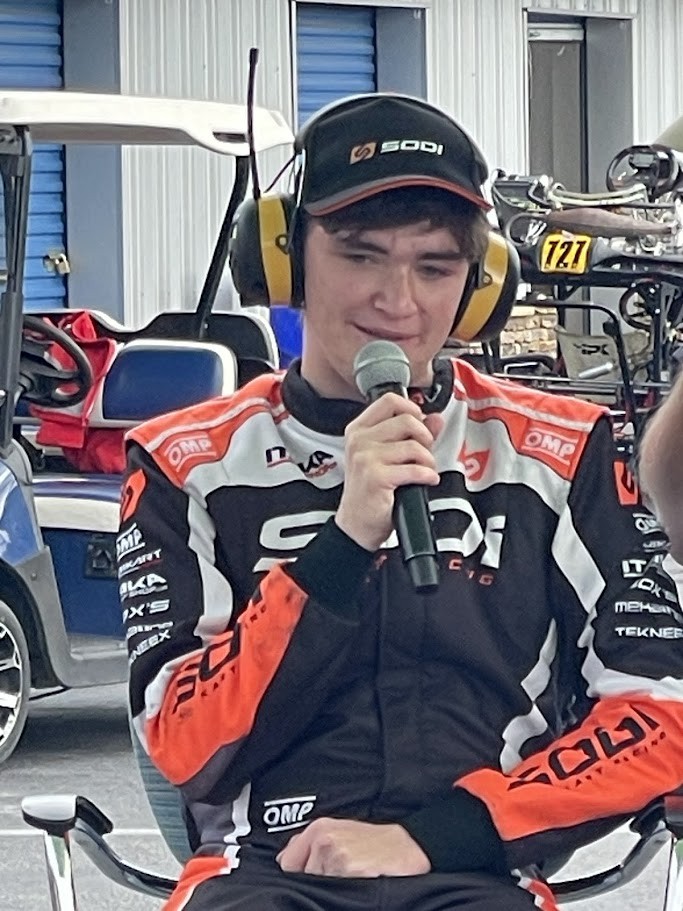
Christian Blevins Jr—a rising star in the racing world who's leaving traditional classrooms in the dust to focus on one thing: becoming the best behind the wheel.
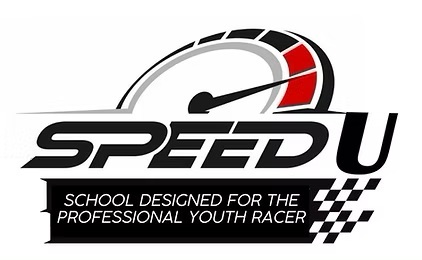
Notes
- What do you race currently? How long have you been racing and how did you get into it? Who has been your biggest influence in getting you into racing?
- What first sparked your passion for racing, and when did you know you wanted to make it your career?
- Who are your biggest professional inspirations in the racing world, and how have they influenced your approach to the sport?
- Having a child who does motorsports takes a toll on the family. How were you able to balance your son’s karting career and his education?
- What are some of the biggest challenges you’ve faced by choosing racing over a traditional school experience?
- Can you walk us through a typical day in your life balancing racing, training, and school?
- How do you handle the mental and physical demands of being a young racer competing at such a high level?
- How does the school utilize sim and education? What have you learned from SIM?
- As a parent have you been able to navigate the business side of racing – Sponsorships?
- What do you think young athletes need to succeed when pursuing non-traditional paths like yours?
and much, much more!
Transcript
Crew Chief Brad: [00:00:00] Grand Touring Motorsports started as a social group of car enthusiasts, but we’ve expanded into all sorts of motorsports disciplines, and we want to share our stories with you. Years of racing, wrenching, and motorsports experience brings together a top notch collection of knowledge and information through our podcast, Brake Fix.
Crew Chief Eric: We’re diving into the high octane world of racing with a young driver who’s redefining what it means to chase a dream. Meet Christian Blevins Jr., a rising star in the racing world who’s been leaving traditional classrooms in the dust to focus on one thing, becoming the best behind the wheel. Instead of textbooks and lockers, Christian’s education happens at SpeedU, an elite racing focused program that’s built for athletes like him, drivers who live life in the fast lane both on and off the track.
David L. Middleton: On this episode, we’ll follow Christian’s journey from training sessions to race day. The challenges of balancing school and sport and what it really [00:01:00] takes to be a champion in the making, whether you’re a racing fan, an aspiring athlete, or just someone who loves a good underdog story strap in because this ride is just getting started.
Crew Chief Eric: And joining me tonight is returning guest David Middleton, our partner from MIE racing, who you might remember from several break fix episodes. So welcome back, David. And along with him, we have Christian Blevins Sr. adding the parental perspective to this conversation as well. So with that, let’s welcome Christian Sr. and Jr. to Break Fix.
Christian Blevins, Sr.: Hey guys, thanks for having us on. I appreciate the opportunity to talk with you this evening.
Crew Chief Eric: In Break Fix tradition, I usually always start off by saying, you know, there’s always a superhero origin story. But tonight we’re literally at the origin of the origin story. So what I want to do is I want to pass the baton to Dave for a moment to sort of set the stage for us.
Why are we talking to the Blevinses? Do you have a relationship with them? So tell us how you guys met and how we’re getting started here.
David L. Middleton: I go up to Atlanta Motorsports Park, which is [00:02:00] out in Dawsonville. And actually I’d been going out there almost since that place opened. So now it’s been 12, 15 years.
It’s been a, it’s been a while anyway. I’d been going back and forth when, when I was living in Europe, I’d come back to visit my in laws and go to the track. But once we finally moved out here, and I’m, I’m within an, an hour from my house, I, I go out there regularly. And one day I popped out there, I was actually looking for a helmet, and I go into the shop and I meet Christian Sr.
and Christian Jr. And we kind of just struck up a small conversation because I hadn’t been on the track in a while, and you guys were actually about to do a session.
Christian Blevins, Sr.: Yeah, that’s right. And Christian Jr. was much younger at the time than he is today.
David L. Middleton: We struck up a conversation. I told him I just moved back from California and I’d been in Europe and he was like, what do you do?
And I was like, well, I was kind of in industry. And then we used to keep running into each other because I would do so much carding. And at the time, his son was still very, very new to carding. And I remember he was getting a little frustrated. And I remember telling Christian Jr. I was like, don’t worry. I said, in a few [00:03:00] years, you’re going to be much taller than me.
And you’re going to be much faster than me. And that’s exactly what I told him. And yeah, now it’s true. Unfortunately,
Christian Blevins, Sr.: on both ends, and he’s taller than me now, too. So don’t feel bad. Yep.
David L. Middleton: Yeah. So when I met him, he was just starting out. So explain where you guys were at the time we met. Cause he wasn’t even in junior cars yet, or had he just started?
I think he might’ve been running L206, right?
Christian Blevins, Sr.: Yeah, he was still in Cadet, L 206. That was maybe even start of our second season. You know, somewhere thereabouts, when we first ran into you up at AMP.
David L. Middleton: To Junior, what are you racing currently? How did you make the decision to actually get into karting?
Christian Blevins, Jr.: Currently, I’m racing X30 Senior. I got into karting partly from my dad, but I went to an indoor karting summer camp at a place called Andretti’s. After that, my dad asked me if I wanted to do this more, and I was like, yeah. Eventually, we went to Atlanta Motorsports Park, and I did the karting class up there.[00:04:00]
A little while after that, for Christmas, I got my first kart.
David L. Middleton: The Andretti camp, was it every single day for many hours, or how did that work?
Christian Blevins, Sr.: One of those. About a week? Yeah, it was a week long, a Monday through Friday day camp. Drop your kid off in the morning, 8 a. m. or something like that, and then come back and pick them up at the end of the day at four or five o’clock.
I forget what the exact time was. We actually kind of stumbled on it by accident. I think I had gone there one day to do a couple sessions of indoor karting. And saw their advertisement for it up on the wall and thought, Oh, hey, this sounds kind of cool. I wonder if our kid would be interested in this.
And so when I got home that day or the next, I asked him summer break was coming up for school. And I said, Hey, what would you be interested in doing? This is. part of your time over summer break and he said yes and so we signed him up for it and little did we think that would start a long journey to where we are [00:05:00] now
Crew Chief Eric: for frame of reference you’re in elementary middle school at this point like how old were you
Christian Blevins, Sr.: oh yeah he would have been in elementary school or yeah that sounds about right in the
David L. Middleton: fourth grade so like nine ten years old Which, unfortunately, nowadays, like, that’s old for someone who gets into karting.
Christian Blevins, Sr.: Right? Yeah.
David L. Middleton: So, Junior, was your dad the biggest influence in getting you into racing? Did you like racing previously? Or was this program the springboard into something that you didn’t really know about?
Christian Blevins, Jr.: I kind of always liked cars. Got that from my dad. I really enjoyed Lightning McQueen when I was a kid, much younger.
That’s kind of how I got into racing because after that I was like, yeah, I really want to do this more.
Crew Chief Eric: All right, dad. So if you’re the influencer in this, what’s your backstory in motorsport? Did you race when you were younger? Like, what’s your affiliation?
Christian Blevins, Sr.: I grew up going to the racetrack. My dad was a motorsports Fan from early on [00:06:00] as a kid, I can remember going to road Atlanta in the mid to late 70s to watch anything and everything that we could get up there to watch from, you know, a local SCCA event all the way up to back in the days of the IMSA GPT cars.
would watch them and everything in between. You know, that’s kind of a lot of my earliest memories going to the track and watching cars and hanging out at the racetrack. And of course, when you’re six, seven, eight year old boy, I can’t think of anything cooler that I would have wanted to do than to go watch fast loud cars go by.
So yeah, that was. Kind of my intro into it. And then eventually my dad got into amateur racing and SCCA. I think I was probably around 14 or 15 at the time when he got into that. Eventually I got into racing as well, again, and [00:07:00] SCCA. Once I kind of hung up my bicycle racing days, myself and another friend of mine that I raced bicycles with, we were, ironically enough, at Road Atlanta watching Petit Le Mans.
He struck up a conversation with my dad who was up there watching with us about getting into SCCA and getting into racing and the Spec Miata class had just really sort of gotten off the ground and my dad was doing that at the time. So we pretty much decided at that race, that was something we should do.
The very next February, we’re at SCCA driver’s school at Roebling road. That started my time behind the wheel in racing.
Crew Chief Eric: So we’ve got some intergenerational club racers and motor sports enthusiasts here. So we’ve got three generations of Blevins is happening in this span that we’re talking about here.
As we’re talking about Christian jr’s story, what’s interesting about this is you hear about. Kids that, you know, I [00:08:00] started in a card at 5 years old and I worked my way up and then dirt track racing and sprint card. I want to go to Xfinity and, you know, they’re working their way up through the Carolina system, you know, and all those kinds of things.
And, and the folks that they want to race in Formula 1, and it’s a very long and arduous road to get there. But you guys are on this path right now. You started in carting in the Georgia area and you’re building up But you had to make a decision at some point, we’re going to focus on it full time. And so to Christian senior, what was that moment that you said, all right, we’re going to pull them out of school and we’re going to go after this full bore.
Christian Blevins, Sr.: That moment really happened towards the end of the school year. really sort of preceded by, at some point in that racing season, Junior made the decision himself. I guess just internally, I don’t think we’ve ever really talked about this. At some point, the switch went from just about having fun to, I want to win.
And so we went from doing everything on our own and [00:09:00] dad turning the wrenches and the cart set up and all of that sort of stuff to starting to work with a team, letting a pro mechanic and a coach and teammates and all that sort of stuff fell into place. We got towards the end of that racing season, realized that, number one, because of that and the amount that we were starting to travel to races and try to be on the national racing calendar in karting, that we were missing school already.
As we got to the end of the school year, realized that we had missed enough days of school at that point that Junior was going to have to take, I think it was one or two of his classes, he was going to have to take the finals. For those classes versus being able to exempt out of them because of how many days he had missed and I couldn’t miss anymore.
And we still had end of the year race at track house to go. And so, yeah, once we realized all that and realized if this is [00:10:00] the direction that we really. want to go, then we’ve got to find a different avenue where we’re not going to have to be concerned about, did I miss too many days of school? Am I going to get in some sort of trouble or possibly get held back a grade or, you know, whatever the end result might’ve been.
So at that point, we really just kind of by accident stumbled up on a Facebook post that came across my wife’s feed that somebody had posted in the carting group up at Atlanta Motorsports Park. Hey, the school down in Griffin called Skip Stone Academy was starting this online school for kids who raced.
So we knew Skip Stone Academy already, at least by name, private Christian school. Their football team played the football team at our former school, also a private Christian school. So we, hey, we know this school already seems. It’s like, you know, a good reputable school. If they’re putting their resources into doing this, then high likelihood it’s going to be a quality product.
[00:11:00] My wife and I talked about it and talked with junior about it and decided, Hey, let’s sign up for it. So we did that part, then we had to go meet the people at the school, you know, do a little interview with the administrators at the school, talk with them about what the program entailed and whatnot, and kind of make sure this was going to be a good fit for everybody.
We concluded all of that and walked away from it with, yeah, okay, this, this is a really good fit. Let’s move forward with it. That’s interesting.
Crew Chief Eric: It is. And so let’s unpack that for just a second. So to Junior, Your dad mentioned, you guys didn’t really discuss that moment. He says you made the decision that you wanted to take on this full time.
What was it for you that just snapped, that changed, that light switch that went off? What was that moment that you said, Okay, dad, I want to do this for real. Like, let’s figure out a way to get this done.
Christian Blevins, Jr.: There wasn’t really any particular moment that I can point out that, uh, It was like, I want to do this even more and I want to win.
It was always, I really like this. And then [00:12:00] gradually it was, I want to start doing this more. And then one day it was just, I want to try and win all of this stuff.
Crew Chief Eric: Were you seeing things even on social media or, or like professional races, something like that, that was drawing you in further into this world?
Like, Hey, I want to be like, so and so. Is there somebody that you’re looking up to in the professional motor sports world that maybe you’re modeling yourself after?
David L. Middleton: Or someone you competed against in karting.
Christian Blevins, Jr.: One of the things in the car world was, uh, Wayne Taylor Racing. I’ve always really liked the cars that they run, and I’ve always wanted to drive one of their entries to whatever racing series that they’ll be competing in.
That’s probably the main one for my inspirations.
Crew Chief Eric: All right, so we got our eyes set on IMSA, so we’re gonna unpack this as we go along. That’s
David L. Middleton: right. How was the transition of having your dad work with you and prepare the cards and everything to going into a team? How was that first year? How did you deal with giving feedback?
Because a lot of the younger generation giving feedback to the engineers is always [00:13:00] an interesting thing. Kids of course are different across the board, but we find that there’s a certain generation that just, they want the car prepared. They don’t really want to give feedback to the engineer. And then when things aren’t working, they don’t always know how to be eloquent and articulate what’s going on.
You transitioning from dad doing everything and you doing everything with dad and having grease to you just kind of basically sitting back and being the pro. You’re paying for the service. How did you deal with that? How did you deal with feedback when you weren’t happy when the cart was maybe not set up in the right way or was pushing in a certain corner?
Like how did you transition from giving feedback to dad to giving feedback to somebody who’s running a team?
Christian Blevins, Jr.: With dad it was always like, hey dad, cart isn’t turning or something like that. When we moved over for that first, like, initial while, I never really had much to complain about because the mechanic who we have has been doing it for a really, really long time.
Like, he mechaniced for Logan Sargent when he was still in Karts. So he knew what he was doing and [00:14:00] I, at the time, I never really had much of a complaint to say, but after a while I’ve been able to give feedback. Like I want more front grip or the front has too much grip. Let’s give it a little less, really just small stuff.
David L. Middleton: Of course, the more you’re in the cart, the more experience you have. Did it become a challenge of like, man, these guys know so much. This guy was a mechanic for a guy who went into formula one and did formula two. Were you able to assert yourself or did you feel like, man, if I say something, maybe I’m saying something wrong and the guy’s going to be like, Hey, that’s ridiculous.
The cart’s not doing that.
Christian Blevins, Jr.: It was really just, I never had much to say, because if I’m being honest, the car felt better than it ever had been.
David L. Middleton: That’s pointing more fingers at dad.
Christian Blevins, Sr.: Dad mechanic and pro, and I would say too, one thing that I’ve noticed. Over, especially this past year, to your point, comes with experience in seat time, as he’s developed as a driver, and he’s pushing the car harder, he’s giving more [00:15:00] feedback now than I think he did in the first two years that we were with this whole team combined this year, I think he’s given more feedback, and I think he’s developed enough as a driver to know what the cart’s doing and then come back in after a session on track and be able to communicate that to the mechanic to say, hey, when I do this, the cart’s doing this.
And then, you know, either that’s good or that’s bad, or can we change it to have more or less of whatever he’s looking for at that particular time.
Crew Chief Eric: Just to clarify for those listening at home. This is still sprint racing, right? We’re talking 20, 30 minute sessions. We’re not talking endurance karting, right?
David L. Middleton: Correct.
Crew Chief Eric: Okay.
David L. Middleton: Well, getting back to the education side and drawing that line, you know, one thing about motor sports is you do reach a point where if your kid is good enough, school becomes an issue, right? It’s not like. He’s playing travel baseball or travel basketball where you’re doing it after school on the weekends.
Like, yeah, we’re gone on the weekends. [00:16:00] We’re gone. Maybe sometimes like Thursday, Friday, Saturday, Sunday, because we got to travel or even Monday. That begins to take, I think, a toll on the family. And how did having a child who does motorsports, how did you guys balance that as a family? If you could just talk also more about how SpeedU and Skipstone was able to give you guys a sense of community and education, because I’m sure that was important to you and your wife.
Right. You didn’t want him just to be 100 percent driver. And then down the line, like got nothing out of his education.
Christian Blevins, Sr.: Absolutely. So yes, education is obviously very important. And, you know, we place a big emphasis on that A’s and B’s keep you in the seat of the cart. C’s, we got to have a little conversation, which we’ve never had to have, and we’ve never even approached, you know, what happens if you have a D.
So we’ve been extremely as parents, we’ve been extremely fortunate in that regard that he’s always done well in school number one. And then I think, secondly, you know, as parents, we did have some concern with going [00:17:00] to speed you in this online education environment where the onus is on junior. To make sure that he is completing the required amount of work per class per week, as well as if there’s something that he doesn’t understand or is struggling with to speak up and say, Hey, I need to get some additional help on this or something like that.
So those were definitely some concerns going in coming from a traditional school type setting with. kids in a classroom in a physical building and a teacher that’s right there in the room with you and you know all of those things that we don’t have now so far it’s worked out extremely well he’s also this school year started dual enrollment so he’s taking his college english class you know while he’s in school it is definitely a balancing act for sure with The travel involved now with what we’re doing going in the second year that we’re doing this amount of [00:18:00] travel.
Now, I like to think that we have it a little smoother than we did the first year, but I don’t really know that that’s the case. That’s maybe just an illusion. I’m telling myself because, you know, there are definitely some challenges with it to your point, but these national level races. Oftentimes, we’re leaving on a Wednesday, and then we’re not back home until sometime late Sunday night.
For Junior, with his schoolwork, one of the great things about the SpeedU program is that he can either know that, Hey, I’ve got this event coming up, so I need to work ahead, so that when I’m out for a few days doing this, I don’t have a whole bunch of makeup work to do on my return. Or, all right, hey, I’ve still got these X amount of things I need to get done once we’re back from the event, knowing that, all right, these next couple of days I’ve got to put in some extra time to get caught back up in these, you know, whatever classes, where, you know, maybe he didn’t get all the work completed before we left.
And then you wrap all of that up with mom and dad still have full [00:19:00] time jobs, trying to balance that out. With travel and taking time off of work and trying to juggle that my wife and I both travel for work. My wife travels extensively for her work. There’s a lot of times where she’s not able to make it to these big national level events.
You know, she’s. somewhere else in the country or somewhere else in the world sometimes and just can’t get back in time to, you know, when we leave, you know, it just doesn’t make sense. You know, she’s maybe not back until sometime Friday night before she could even consider coming to the race. So it’s definitely a struggle in that aspect.
David L. Middleton: Has that been the biggest challenge that you have faced having your son? pursuing this?
Christian Blevins, Sr.: Probably so, now that you say that. The school piece now through SpeedU is, actually, that’s kind of easy. But, you know, it’s not so easy for myself or my wife to just go, oh, well, you know, we’ll just work ahead because we’ve got to be out of the office these next few days, right?
We, as adults, we all know it, you know, doesn’t necessarily [00:20:00] work that way. So, I think that’s probably the biggest challenge that we face with all of the traveling is. It’s sort of, okay, who’s going to this event? Can we both go to this event? What happens at home while one or both of us are gone to whatever the event may be?
And you know, trying to figure all of that out, I would say last year, which was the first year that we really hit the national schedule hard. That was probably one of the biggest pieces to kind of try to figure out how do we manage all of that. If I’m being honest, I’m not sure that we still have that completely figured out.
Crew Chief Eric: How many other kids that junior is racing with or against are in similar programs? There are a large amount of the folks on the national stage and national carding that are doing the same sort of thing. Are you guys part of the norm? Are you still part of the exception?
Christian Blevins, Sr.: My sense is, from the few parents that I’ve spoken to, especially ones that know what we’re [00:21:00] doing, but they’re not doing it, I think we are a little bit of the exception.
Of course, you know, the primary one is their kid is still in traditional school. And they’re missing school and taking time off and all of that stuff. The next group of kids are kids that are in some sort of homeschool type program, whatever that looks like. They’re still dealing with, if my kid needs help in a particular Subject that they’re not doing good in or something like that.
They’re trying to figure all that out on their own as a homeschool parent or, you know, where do they go to get whatever resource they need or whatever homeschool curriculum that they’re following is, is it going to meet all the accreditation standards and whatnot so that when their kid goes to apply to college?
that they can get in. We had this unfortunately happen to a friend of ours that we know very well that they did the homeschool thing, got to the end of it, and realized that one of the subjects that we [00:22:00] took, I don’t remember all the details on, but they either didn’t do enough hours in that subject or, you know, there was something there that was lacking that they were going to have to go back and redo some work in that one subject area where we don’t have to worry about that with this program.
So it takes a lot of worry off the plate when we first looked into doing this program was one of our big concerns like, okay, this all sounds well and good, but, you know, at the end of the day, does this get us what we need, what junior needs to go from high school student to college world at the end of it, or, you know, are we going to get to the end of this and find out, oh, we don’t have this, this or this, or, you know, this was just a colossal waste of time and money.
So, so, yeah, I think that’s been a big advantage for us in that aspect of we don’t have to try to figure all this out. Somebody has already done that.
Crew Chief Eric: I’m sure there’s a lot of parents listening right now, trying to run the numbers and figure things out. So let’s unpack this a little bit [00:23:00] more. You mentioned the curriculum and it’s part of an existing private school.
The speed you sort of is a, let’s say subset of that.
Christian Blevins, Sr.: Mm
Crew Chief Eric: hmm. Is it completely self taught? There’s no instructor led anything, or is it more like the COVID times where you’re working remote, there’s a teacher that checks in every so many days, and then you’ve got assignments, you gotta, like, how does it work exactly?
So they
Christian Blevins, Sr.: do have a, what they call a, what do they call it? Your weekly check in? Yeah,
Christian Blevins, Jr.: it’s a weekly check
Christian Blevins, Sr.: in. So they do a weekly check in, I think it’s on Tuesdays. Where the whole class gets together all the grade levels of the kids that are in this program, they get together with one of the administrators from the school all on a zoom call that usually last somewhere around 30 minutes.
They kind of talk about what’s going on. What have you been doing? You know, what’s going on in your world? What’s coming up? What do you have on your radar? And then they’ll intersperse that a lot with having a guest speaker will [00:24:00] come on and talk about some topic to the kids, making sure everybody’s sort of corralled and staying on task for the week and the month and whatnot.
The actual classes themselves, Junior sits down in front of a laptop. How would you describe it? Like a video you watch?
Christian Blevins, Jr.: Yeah, a video, and then there’s some questions based on the topics that were in that video, and you answer those, and then you move on to the next lesson, which is another video, and then questions.
Crew Chief Eric: So computer based training, I’ve got this scenario in my head of this virtual one room schoolhouse, right? You mentioned all the kids from all the grades get together for these check ins.
Christian Blevins, Jr.: It’s all grade levels, which is from elementary to high school.
Crew Chief Eric: Oh, wow. Are they all from the same geographical area, or are there kids from all over the United States in the SpeedU program?
Christian Blevins, Jr.: Pretty much all over the U. S.
Crew Chief Eric: Okay.
Christian Blevins, Jr.: There’s some people in Florida. Georgia, [00:25:00] I think it might still be California. So kind of all over.
Crew Chief Eric: Okay. Thinking about tuition, are you paying the normal rate to the school? Are you paying a, you know, a lower rate? Is it a rider on top of the standard? Like, how does it work from a dollars and cents perspective?
Christian Blevins, Sr.: Their fee is to do this particular program. So it’s not like you’re paying the fee to the traditional school and then paying some sort of additional fee on top of it to be in this program. You’re just paying for just this program. Nothing additional. Personally, we found the cost to be actually a good bit less than what we were paying at our previous private brick and mortar school.
So that was a nice surprise to find out that, you know, this was going to hit the pocket, but less.
Crew Chief Eric: I mean, that buys some tires and gas at the end of the year, right? It does. Yes, absolutely.
Christian Blevins, Sr.: So yeah, that helped out a lot. I’m sure a question for the parents out there that they’re thinking about. When I talk with other people whose [00:26:00] kids aren’t even in motor sports, and I tell them, you know, what my kid does and where he goes to school, I think they kind of automatically assume the curriculum is somehow different.
Junior is taking the same high school classes. That any other kid in high school would take as far as, you know, the English, the science, the math. All of that’s the same. You could walk into any school and find the same subjects being taught where things differ a little bit, especially like with the weekly check ins that they do.
Those will oftentimes have a very tilted slant towards the motor sports. World and the guest speakers that they have are typically somebody from the motor sports world. And then our field trips with the school are very different than traditional school field trips. So, all of our field trips revolve around motor sports for the most part.
Case in point, our first year with the program, was it October, I think it was, when we went to North Carolina? The school put together a [00:27:00] field trip, and it just happened to work out perfectly with a national level race that was at Track House in Mooresville. The school did a field trip up to the Mooresville and surrounding area that, you know, home of NASCAR and whatnot.
We went up the week before. To do some practice at the track to stayed up there that whole next week because the field trip encompassed like three days of that week, we went around, saw various race teams and spoke with team owners and program directors and engineers and all that sort of aspect of the motor sports world that a lot of people probably don’t even realize exists.
And then at the end of that week, we were back at the track again, getting ready for this national level event. In between all of that, Junior was able to sit in our hotel room on his laptop and get his schoolwork done. That worked out really well. And the field trips are super cool. Who did we get to meet?
Hold on, I know this. I don’t
Christian Blevins, Jr.: know why I can’t remember the name. Sunglasses, big hat. Richard Petty! There you go! The
Crew Chief Eric: [00:28:00] king!
Christian Blevins, Jr.: The king. The king! I don’t know why I couldn’t remember that there.
Crew Chief Eric: Guys, they’re lucky I haven’t even got to interview him yet. Man, alright. One more piece of this, just from the parental side, right?
Cause you’re at that age, dad, you mentioned before, you got to start thinking about college. Has the academy, the brick and mortar school, assigned a college counselor to you guys yet? Have you been talking about what the next steps are? Have you identified programs that will accept the Speed U and all that kind of stuff?
Are you thinking very local in the sense of like, maybe something like Belmont Abbey? Which has a motor sports program, you know, stuff like that. What’s the next step? And what are those conversations like now that you’re in this program in its second year?
Christian Blevins, Sr.: Honestly, I think we’re probably a little behind getting some of those conversations going with the school coupled with junior.
I don’t think has really decided which direction he wants to go after high school as well. So we’re still feeling that out, looking at options, if it was up to me. If it was up to dad, you mentioned Belmont [00:29:00] Abbey, which I didn’t realize had a great program. I might need to talk with you some more offline.
Of course, I know Clemson has a great program, you know, knowing my kid’s passion and love for the motorsports world. I’m trying to push him to look that direction at some of these programs. One of the things that is a big sort of saying at SpeedU with the people that run that program is it’s great that you want to pursue this route and try to make it in this world of motorsports as a driver.
But what’s your plan B? And so you got to have a plan B. And as you and David well know from your experience, there’s so many avenues and so many roads in the world of motorsports, so many different things you can do and still be involved in this arena, even if you’re not the guy behind the wheel.
Crew Chief Eric: We call that the autosphere.
Christian Blevins, Sr.: The autosphere. I like it.
Crew Chief Eric: There’s one more piece of this before we transition into some other topics that Dave wants to talk about it’s really for junior You’re not in a traditional school your high school experience when you [00:30:00] look back on it You’re gonna be telling people man I did this thing and I was on the road with my dad and we’re racing but I didn’t have The same emotional connection.
You don’t have the same kind of classmates. And as you said, there’s varying in age, maybe some of them you race with. Some of them you only get to see at the races. And again, in this day and age, we’re all connected through social media and discord and this and that. So I’m sure you’ve got friends that you’re connecting with, but emotionally, how is this affecting you?
Like not being in a brick and mortar school, have you given it any thought?
Christian Blevins, Jr.: At first it was pretty difficult because I had a lot of friends and the school that I used to go to. Because I’ve been there since first grade, all the way up until, uh, ninth grade. I got the idea of what high school is like since I had one year in it.
I was able to get used to not being able to see my friends in person nearly as much. But, like, we still talk every now and then, and I see a lot of my, uh, friends from racing nearly every weekend.
Crew Chief Eric: So do you [00:31:00] think, in a way, it adds a level of clarity and focus to what you’re doing? Because you don’t have all the distractions, whether it’s the pubescent ones, the dramatic ones, you know, the girlfriends, all the other stuff that sort of comes along with high school.
With all that distraction out of the way, do you think it’s going to make you a better driver?
Christian Blevins, Jr.: I feel like it never really had an impact. I was just able to kind of just put it aside when I was racing.
Christian Blevins, Sr.: Yeah, and I would say that was one thing I was going to say too, that social aspect for the parents that are out there, because that was a concern of, you know, my wife and I’s.
Going into this program and sort of losing that connection with the kids that he knew and, you know, that aspect of high school and that socialization and peer group and all that sort of stuff that we, and a lot of aspects don’t have, in fact, we just got an email not long ago from the actual brick and mortar school that runs this program.
They have prom coming up. [00:32:00] Uh, right. And so we really hadn’t even thought about, at least I hadn’t, until that email hit my inbox. Oh, prom is coming up pretty soon. What do we do? We don’t know anybody at the school. The kids that are in this program are really sort of apart from the whole rest of the school.
I don’t know that if we walked on campus. Somebody at that school would go, Oh, that’s Christian jr. He’s in the speed. You program. He does. I don’t think anybody there would know who we were, why we were there.
Crew Chief Eric: Well, the fact that he’s in his racing suit, because that’s the only suit he has that,
Christian Blevins, Sr.: that might, yeah, that might, yeah, that might give it away.
Yeah, you know, that was a concern of ours going into this, but like you said. People, especially kids nowadays, are so connected with each other through this social media universe. I have my own thoughts on that, for better or worse, but you know, we [00:33:00] were at Track House last year. I keep seeing this kid coming over to where Junior’s at on Grid before he’s going out for his sessions on track.
And I didn’t think much about it at first. Until I keep seeing this kid over and over again, and then I’m like, Wait a minute, I don’t know that kid. Who is this? Finally I asked him, I was like, Hey, who’s this kid that keeps hanging around? Do you know him? Like, I had no idea. And he’s like, Oh yeah, that’s my friend.
And I’m like, Well, how did you meet him? Oh, we met on Discord. Discord? What’s that? Right? And then I’m like, Well, where is he from? Wisconsin. What? I need somebody from Wisconsin on this thing called Discord. That’s what kids do these days. Yeah,
David L. Middleton: right.
Crew Chief Eric: So, Dad, to kind of close out this thought on the parental side of things.
If you could go back in time and this program was available when you were juniors [00:34:00] age, do you think you would have done it? Knowing what you know now?
Christian Blevins, Sr.: Oh yeah, absolutely. I’m that personality type that when I’m going at something, I’m all in. It wouldn’t have mattered to me, that social aspect. Like, oh, I don’t have any friends other than the people I see when I’m at the racetrack.
Okay, that’s fine because I’m doing this thing right here that I’m really passionate about and I’m chasing after it. That’s all that matters. Like, that’s my sort of mentality for better or worse. If this program had been available when I was growing up as a kid and if we’d had the financial means, my parents to do for me what we’re able to do, my wife and I, for our son.
Yeah. Sign me up.
David L. Middleton: Well, Christian, I got news for you. All four of us sitting in this room are exactly the same.
Christian Blevins, Sr.: Right.
David L. Middleton: You know, we wouldn’t be in this room if we were different. That’s the way all four of us are, where you’re going to basically put everything aside to chase your dreams and to chase what you’re passionate about.
I know for sure, Eric and I talk about this all the time. [00:35:00] And there’s just a certain set of people that we are this way. We don’t care about everything else. It’s like, this is a goal I set. And this is what I want to do and I don’t know how much time you’ve been on track recently, Christian, but you know, Eric spends a lot of time on track and I still try to get out there.
I’d like to get more, but my mom joked and she said, every time I see you on track, you seem at peace. And I say, yeah, I find peace at the racetrack. That is where I’m most at peace. I’m not thinking about my kids. I’m not thinking about parents, job, anything. I’m really focused on myself and how I could be faster and what I got to do to be faster than the next person.
Right. So there’s this piece that you get out there and not everybody’s built that way. Yeah. You’re in a good group, but to you, junior, I’ve got a question about speed. You. So you’re at a, you’re at a place called speed. You, what do they do from an educational standpoint for your race craft? Do they use any tools to make you faster?
Do they talk about physical training to prepare for being a driver or. What kind of things like that are you getting out of this program? Or is it strictly educational and are they teaching any kind of engineering stuff?
Christian Blevins, Jr.: It’s mainly, uh, educational [00:36:00] speed. You is like its own thing. And then there’s another thing that is affiliated with the school
Christian Blevins, Sr.: of the synergy, synergy
Christian Blevins, Jr.: speed lab is like their actual racing shop and team, which they do like legends car racing, band of arrows, late models, and things like that.
Like whenever I go to one of the events, like PRI, they’ll be there and they’ll have like some of their sims there. We’ll be there representing the actual education part of it. Do they use sim
David L. Middleton: training in your curriculum? How does that work? We did see the sim, but how do they utilize that? Or do you have to go down to Skipstone and use the sim?
Do they have certain days where, like, all of you can come down and do training in that way, whether on the sim or off the sim, or anything, working on your racecraft or the mental side of driving?
Christian Blevins, Jr.: They don’t, but from what I know, you can pretty much just go down there since you’re with the school. They’ll most likely let you do some laps on the sim.
Okay. I haven’t really gotten a chance to [00:37:00] do that though.
Christian Blevins, Sr.: They do have the sims, which you guys saw at PRI. You know, they take certain ones around to different events that they’re going to, to provoke the school program itself. You know, if we wanted to drive down to the Griffin, Georgia area where they’re located at to go in their shop and hop on a sim, we, we certainly could.
But, you know, for us where we live on the west side of Atlanta, just kind of logistically doesn’t really make a lot of sense to make that trip down there. Plus, finding the time to do it as well. It’s something we could take more advantage of than we do, but at the same time. Logistically, I don’t really know that does it make a lot of sense to try to fight through all that traffic to get there, spend whatever amount of time where they’re doing that, and then fight our way through traffic to get back home.
Crew Chief Eric: So then as an alternative to that, are you doing SIM at home on your own?
Christian Blevins, Sr.: Yeah.
Crew Chief Eric: Are you strictly iRacing? Are you mixing it up? What are you using to practice, and what are you practicing [00:38:00] with?
Christian Blevins, Jr.: iRacing is the main one, but I also use Assetto Corsa for when I just want to drive.
David L. Middleton: iRacing is the gold standard for most professional drivers.
I don’t think there’s ever going to be a Well, I don’t think in the next few years there’s going to be a major shift. But a lot of professional drivers are also using Assetto, which is used in industry. And yeah, LMU is getting a lot of positive feedback right now, now that they’re tweaking the game and getting it up to par.
Christian Blevins, Jr.: Yeah, I’ve been wanting to try that random R factor.
David L. Middleton: And if I think back when we first met years ago, I told you guys I was in the middle of developing a sim program because my program was still fairly new. How has sim helped your driving? And what are you learning from it going forward? Because one thing I talked to your dad about, and I told him, there’s so much you can do in the sim with, and this is why it’s such a great teaching utility, whether you’re going to be a driver or engineer or things like that.
So how are you using the sim different from maybe when you started years ago to what you’re doing now that you’re more of an experienced driver?
Christian Blevins, Jr.: Mainly it’s, to me, it’s still about just keeping the [00:39:00] reflexes sharp, kind of a substitute for being in the seat, although it really isn’t a full substitute. It just complements to it, if anything, but that’s mainly what I’ve gotten out of it so far.
David L. Middleton: Do you use setup shops or are you tweaking setups at all? Have you started messing around with that?
Christian Blevins, Jr.: I prefer to do
David L. Middleton: fixed setup.
Christian Blevins, Jr.: Okay. The only thing that I even somewhat bother with for setup is another software called Kart Racing Pro. It isn’t compatible with the PC that we use for The Sim. I use it on my gaming PC, and I can still connect it to The Sim.
I just don’t really feel like picking up my PC and going into a different room. Connecting all that up, and then when I’m done, unconnecting it, moving it back, and all of that. That makes sense.
David L. Middleton: When you guys get your new hardware, I’ll get you hooked into some software where you can basically start tweaking, go faster, and just play around with it.
Because I think that’s very vital going forward. It’s not exactly one to one, but there’s so much you can do [00:40:00] that will help to teach you. More vehicle dynamics and carry it forward as you step into the next stage of your career.
Christian Blevins, Sr.: And I think, you know, that’s going to be something I’m kind of interested to see as we start to transition out of the cart and into the car utilizing the sim, because, you know, let’s face it, the carting world, especially our proximity to AMP, even though we’re not super close, we get up in the morning, we drive up there, we do what we do and drive back home and we’re home in time for dinner.
Right. That’s real easy to do in the kart. Not so easy to do in the race kart. I do see the day coming where the sim is going to start becoming a more vital aspect of what we’re doing to hone those skills and keep the reflexes and practice techniques and all of those things because we simply, we won’t have the ability like we do now with the kart to go, Oh, it’s Saturday.
Let’s go spend two hours driving around the kart track. Unless mom and dad win the lottery, that ability is going to go away. [00:41:00] So yeah, I’m very eager to see how the Sim is going to fill that gap.
Crew Chief Eric: Christian Sr., you brought up a really good point, the next steps. And Junior, you’re right at almost legal driving age.
So the question becomes, what is the next step when you step away from karting? Are you gonna go do some autocross? Are you gonna go straight into club racing and dust off the patina off a dad’s Miata? Like, what is that next step there?
Christian Blevins, Jr.: Do you want to start that out or should I start that out? I guess I’ll start it.
Okay. I don’t really know what we would do for cars. But I’m pretty sure they’d probably be going to club racing. I don’t know if it’d be oval and like legends cars, road course and legends cars, or like radicals for road course. It’s kind of whatever we end up feeling gives the best option.
David L. Middleton: You guys are going for a test though, right?
Aren’t you going? We’re a radical test.
Christian Blevins, Sr.: Yeah. Yes, we are. So yeah, junior mentioned the legends car. So we did a test in a legends car back last November with the [00:42:00] help of some folks at speed. You that do some people in the legends car world. We were able to set that up. So we spent a day in the legends car.
I think you had a blast. You liked it. Yeah. Yeah. And, uh, you know, now we’re set up to do a test day in a radical up at amp. Yeah. You know, and I think from there, we’ll kind of look at between the two and sort of look to make some sort of a decision between which path do we go down, you know, one of those two roads, which are very different from each other.
But there’s going to be a lot that goes into that decision. What are we comfortable with? Also, a big part of that decision is what opportunities present themselves with which one of these roads that we might pick to go down. The Legends car is, of course, in that ladder up into the NASCAR world. And one of the great things about SpeedU is that really all of the kids that are in this program That’s the direction all of them want to go.
They’re all in either [00:43:00] Bandoleros or Legends cars. We’re really, I think the only people in the Speed U program that are in karting and in the road course world full time, you know, we kind of see where the Legends car road sort of goes and we know. people in that sort of world already versus the radical.
We don’t really know anybody in that world, but it also looks like there are some exciting things happening in that world, especially up at AMP with the primal school that’s up there in the, in the program that they’re running and some of the things they’re doing with a race series. That’s. kind of merging some of that gamer sim world and bringing that over into the car world.
And so, you know, if that’s the route that we go, he may get out of the radical at the end of the day and say, dad, I hate this thing. I kind of doubt it. You won’t, you won’t. I’ve been in a radical. Nope. Nope. You
David L. Middleton: definitely won’t.
Christian Blevins, Sr.: But yeah, so that’s kind of what at the moment, what the world sort of looks like for us as [00:44:00] we.
Transition out of the carting and into the car world. Speck Miata was also a discussion of maybe that’s a path as well. Junior wasn’t super excited about that. I don’t want to rely only on draft. Of course I’d love Speck Miata. It’s what I did. It’s a great class for a lot of different reasons, but the last few races that I did in Speck Miata, I looked around and started to realize unless something changes.
These are all cars that were at best 15 years old or older. It’s a spec class. And so if you need a new wiring harness for your injectors, where do you get that from? The junkyard. What’s going to happen there in another five years? And so that gave me a little pause about going down that particular pathway for as good as it is.
I think there are going to be some things that need to change with that category because Those cars aren’t getting any younger. Parts are becoming [00:45:00] increasingly harder to find for these cars if they’re not gonna make some provision for, okay, we realize some of these parts that fail on these cars because they came from a street car and now we’re asking them to live in a race car environment but there aren’t any new parts of these parts.
Something’s gonna have to give at some point. I really do worry about what’s gonna happen with that class. Ultimately, so yeah, we talked about spec Miata, maybe that’s something we still dabble in at some point, but I don’t really know
Crew Chief Eric: you alluded to something earlier as you move up, things get more expensive.
That’s the punch line of motor sport,
Christian Blevins, Sr.: right?
Crew Chief Eric: Pay to play. So that said, depending on the path you choose, every one of them has some sort of financial burden and it takes us into a conversation about what we talk a lot about with pro drivers, which is the business side of racing. And it seems to be the consensus among drivers.
One of the things they. Is begging for money from sponsors and then the sponsorship commitments and, you know, got to go here and public [00:46:00] speaking and show the car, you know, all these obligations. Suddenly they become part of this media machine and there’s less focus on them winning so much as being a commodity to the businesses that they’re representing.
And so, as a parent. How are you setting the stage for sponsorships? Have you started to reach out? How are you building a business plan for your son as he is now starting to choose where he’s going to go once he’s graduated away, not only from speed you, but from carting itself.
Christian Blevins, Sr.: Yeah. So a project that he has.
That is not completed yet. I will point out Jr. It was too, I wanted him to work on my initial thought was just kind of a simple one page flyer that he could go around to businesses with or hand out to people kind of, this is who I am. This is what I’m doing in exchange for these different levels of sponsorship.
Here’s what you’re going to get back out of this, which I think is. Super important. Drivers hate going and [00:47:00] looking for sponsors, but I think maybe the next thing they hate probably the most or hate even more is then the obligations that come after that and standing in front of a room of people to talk about what it’s like to be a race car driver or show up somewhere with your car, whatever that looks like.
But I think in this day and age where there’s so many different things that are vying for. Businesses, attention, and dollars, at least in the world of motorsports, it’s no longer about what happens on Sunday between the green flag and the checker flag. Yes, that still ultimately does play a part, but I think the bigger thing now is what happens from after the checker flag on Sunday until the next.
Green flag on Friday or Saturday because if you can’t show yourself as a individual and a driver to be somebody to that business owner that you’re asking to hand over money, if you can’t [00:48:00] show them that you’ve got a good head on your shoulders. You’re not going to go out and do some boneheaded thing that’s going to ultimately reflect back on that business owner’s business.
They’re quickly not going to care about what you did on Sunday, and they’re going to go find somebody else. And that’s a big topic of discussion in the program at SpeedU, that they really harp on with all the students there is, Yes, we want you to be whatever level you can be as a driver and hope you succeed in this world and in all of those things, but we want you to be a quality, upstanding person.
That’s number one. You see this at the track, even in the karting world. For better or worse, I can look at how somebody’s kid acts. At the kart track, I can be pretty assured, I can tell you what their upbringing’s like. The parent’s reflection comes out in that environment, maybe unlike any other. There’s all this emotion at the race.
Your adrenaline’s [00:49:00] pumping, and you’re going after it, and somebody sends you off in a corner. Watch what that kid does after that. And that will tell you a whole lot about that kid’s parents and how they’re raising that kid.
Crew Chief Eric: I thought you were going to tell me there’s the equivalent to dance moms and carting.
There’s like cart dads.
Christian Blevins, Sr.: There’s cart parents. There are cart parents. I think dance moms are probably worse, but.
Crew Chief Eric: You know, you guys are really taking a non traditional path in the world of sports, whether it’s motorsport or sports in general, right? Like, this is a really interesting paradigm that you guys have going on here.
The speed bumps in the road aren’t clearly visible yet, and there’s challenges to be overcome. If I pull any lesson back from the pros, sponsorship is it. Coming up with the funding to race. As your job, because remember, you’re going to become a professional driver. That is your career. What you do for a living is drive cars.
So again, to the point of earlier, what’s your [00:50:00] plan B, you know, if it doesn’t work out and I don’t want to pass any shadows or clouds on things, but it’s a really serious discussion that I think a lot of people get excited about the wins and the trophies we’re moving forward. forward and then you get to this point where you’re like, money don’t grow on trees.
There’s a lot of sacrifice, a lot of compromise in there. And so my best advice in this case is finish that project. Your dad set out for you there, junior, and come up with a business plan, come up with an executive summary, come up with a way to sell yourself. Self as an asset to these businesses, whatever they are.
And the one thing I’ve heard from a lot of folks is they were afraid to knock on the door of that company because they were like, well, why would they be interested in racing? Why? Why would they be interested in sponsoring me? And if the lesson there was the worst they can say is no, but if you don’t ask, you’ll never know.
So that’s also important is. Just try different things and see who can rally behind you because you don’t know where it’s going to take you next. There’s a lot of things to think about there and we could probably talk on sponsorship for a whole nother episode. But I do want to move on a little bit here [00:51:00] as we sort of wrap out this episode.
Dad, if you could give a piece of advice. To other parents, knowing what you know now and going back to my point about not knowing all the speed bumps that are yet to come, what would you say to another parent that was in your shoes a couple years back looking at this going? Is this the right thing for my son or daughter?
David L. Middleton: I’m just going to throw this into. Eric and I have girls who really love motorsports and they’re really young. And we’re always like, Hmm, I really want my daughters to get into motorsports. And they, they know what we both do, but there’s also the hesitation of like, we know what’s going to happen if they start going down this path.
I know enough people in industry. I can make phone calls. I could say, Hey, if my girls get good enough, I can make phone calls. I can do this. But at the end of the day, sometimes there’s this hesitation because I’m like, man. That is a sacrifice. You know, it’s such a sacrifice to get your kid to that next level.
So, you know, you’re not just talking to the main audience. You’re kind of talking to us too, who have kids who aren’t that age, who like motorsport.
Christian Blevins, Sr.: Yeah. Yeah. I forgot about that. The main things I would say, [00:52:00] looking back from where we started to where we are now. Take small steps in the beginning, because you ultimately don’t know until you get to a certain point, kind of where we’re at, is this something they’re really going to stick with?
You know, right, we’ve all seen, you could pick the sport even, it’s not just motorsports, but you could pick the sport where you see the parent with the kid that has all the latest, greatest equipment, everything’s top dollar, and it’s their first time doing this. So you could go down that road. I would say don’t.
Start out small, take baby steps, make sure this is really going somewhere, whatever that looks like. Enjoy the journey as well. I think we all know here that there’s days at the track that are just Fantastic. You get the win or you clench pole or whatever that is. And it’s just the best day ever. But those days are rare in the sport.
There’s a lot of days where it didn’t go right at the track. You leave the track not feeling good and you feel [00:53:00] dejected and you question, what the heck are we doing here? I would just say enjoy the process and enjoy the journey because You said earlier we met however many years ago up at AMP and now we’re at where we’re at and it seems like it’s gone by in the blink of an eye.
That
David L. Middleton: is so true.
Christian Blevins, Sr.: Take time and enjoy the journey. And then the other thing I would say is remember that, you know, motorsports. It’s the long game. Yes, when you first get into it, at some point, you start making these big strides, right? You go out one day and you find, you knock off three seconds off of your personal best.
And then the next time you go back to the track, you knock another two seconds off. But then you get to that point where you get to the track and, wait a minute, I didn’t find any time today. Wait, I lost two tenths today. Or, you know, you’re stuck in one spot for two months before you find another tenth.
To get any faster, it’s a long game. I think it’s real easy, especially in today’s society and [00:54:00] world, to lose focus on that with The younger generation where it’s all, we want instant results. We want it right now. And we want to see immediate improvement and all of those things.
Crew Chief Eric: If you want that, go drag racing.
You’re right.
Christian Blevins, Sr.: Yeah. And by and large, motorsports doesn’t work that way. Right. And so it’s easy to get discouraged. You know, you just got to keep your eye fixed. Way down the road and take little baby steps to get there
David L. Middleton: and junior. Do you feel the same way? Like what advice would you give to someone like our daughters who our kids are almost same age, right?
Like 10 and 8 and they’re watching emza with me. Well, you’ve seen him at amp, you know You’ve seen my kids at amp and you know, we go up to petite every year And at least my eldest keeps asking and because of the situation our family is in like I can’t put them in carding right now, but she keeps asking, you know, she’s like, I want to do this.
I want to do this. So what would you say junior to like a young person who’s 1011 maybe has done a few things? What advice would you give them as they’re starting out?
Christian Blevins, Jr.: Don’t give up. It’s gonna be a long road either way. So just keep getting out it. [00:55:00] That’s really the best thing you can do.
Christian Blevins, Sr.: Remember why you got into this?
To begin with, right? Good advice. But we still do this some now where we’ll have a day where we’ll go to the track, especially up at AMP. We’re just there to have fun. We may go there that whole day. We’re not working on anything in particular. We’re just making laps and having fun. I think as you get down this road, obviously things do get very serious, and they should because of where you’re trying to get to, and they have to be.
But if you could take a moment to step back once in a while, and just go to the track and remember. Why you fell in love with this and why it’s fun and just go do that not worry about oh today I’m showing up to the track to work on these three things or this one thing or whatever just go drive Make time to do that once in a while, you know to kind of keep a perspective of hey We’re here because we like this because It’s fun.
David L. Middleton: So yeah, I guess biggest question is, what is Junior your final goal or dream? How do you see five to ten years out? I know you mentioned Wayne Taylor, but is that the end goal? What would be your dream scenario to dream big for a second?
Christian Blevins, Jr.: [00:56:00] Probably prototypes. Or like IndyCar or something like that. Super Formula.
I think those are really cool. Or if like GT3 or Super GT, those are also really, really cool. Just somewhere in cars, really anywhere.
David L. Middleton: Now, would you be a factory driver? Or have you ever thought about that? Like being a factory driver or are you going to be more like a gold platinum driver?
Christian Blevins, Jr.: Honestly, whatever is easiest for me to do.
Whatever can get me the farthest. That’s. Kind of how I always think. It’s like, if this can take me somewhere that’s worth it, I’m gonna go. Keep your options open.
Crew Chief Eric: And your eyes up and be situationally aware, right?
Christian Blevins, Jr.: Well,
Crew Chief Eric: we’ve reached that part of the episode, gentlemen, where I like to extend the opportunity for our guests.
To give any shout outs, thank yous, promotions, or talk about anything else we haven’t covered this far.
Christian Blevins, Sr.: For all the folks out there, obviously, that might be interested in the school program that we’re doing, please check them out online. Coincidentally, along with that, the [00:57:00] school is running a sim racing based contest that you can sign up for.
I believe it’s a 25 fee to sign up for it, like an online racing league using iRacing. You know, a number of events scheduled throughout the year, the grand prize at the end of it is a fully funded legends race for the winner of that competition. So, for any aspiring young drivers out there that have a SIM and you’re looking to get yourself into a car could be a great avenue for you to do that.
I’d like to
Christian Blevins, Jr.: thank the chassis manufacturer, SOTY. I’d like to thank their US department, SOTY USA. I’d like to thank our local shop, DCT. They’ve helped us pretty much our entire karting careers. Leo, who’s the owner of DCT. He’s been a great coach, been a great friend too. And then Miguel, he’s my mechanic.
He’s really good at what he does. I’d like to thank D2 Motors, they’re our engine builder. They make really good motors and we’re going to [00:58:00] be running with them a lot this year. So looking forward to that. My mom and dad, I’d like to thank them for my sponsors. Both of them are my sponsors.
David L. Middleton: Really quick, Christian Jr.
Where can we find you on social media? Are you on social media? I know you’re using Discord and hopefully you’ve taught your dad what Discord is. But can we find you on social media, whether on Instagram or TikTok or Facebook or anything like that? Is there any way to follow you and you follow your journey?
Christian Blevins, Jr.: Last Turn Racing on Instagram. Search up Last Turn Racing and that should give you the account. Okay. I want to try and get a YouTube channel one of these days. I want to get a GoPro that way I can post them on boards because that would be pretty nice. I think the Facebook account is also Last Turn Racing.
It is.
David L. Middleton: Well, anyway, fellas, from the twist and turns of racing to the challenges of balancing education and competition, Christian Jr. is proving that sometimes the road less traveled is the fastest one to success. [00:59:00] If you are an expiring driver and you want to learn more about SpeedU’s program, be sure to visit www.
skipstoneacademy. org. for more details. And if you want to keep up with Christian Jr’s journey, you’ve heard his social media and definitely stay tuned for more behind the scenes action.
Crew Chief Eric: And with that, gentlemen, I can’t thank you enough for coming on break fix and sharing the beginnings of your journey of your story with us.
So Christian Jr, I can’t applaud you enough for what you’re doing. We’re rooting for you. Keep pushing those limits, keep chasing those dreams. And remember, there’s always another green flag ahead of you. So we hope to see you back. You have an open invitation to touch base with us. Tell us more sections of your story.
Keep us up to date on your progress. And again, the best of luck. Absolutely. Thanks so
Christian Blevins, Sr.: much, guys. We really appreciate the opportunity and get to hang out with you guys. Yeah. Thank you.
Crew Chief Brad: If you like what you’ve heard and want to learn more about GTM, be sure to check us out on [01:00:00] www. gtmotorsports. org. You can also find us on Motorsports. Also, if you want to get involved or have suggestions for future shows, You can call or text us at 202 630 1770 or send us an email gtmotorsports. org.
We’d love to hear from you.
Crew Chief Eric: We hope you enjoyed another awesome episode of Brake Fix Podcast brought to you by Grand Touring Motorsports. If you’d like to be a guest on the show or get involved, be sure to follow us on all social media platforms at GrandTouringMotorsports. And if you’d like to learn more about the content of this episode, be sure to check out the follow on article at GTMotorsports.
org. We remain a commercial free and no annual fees organization through our sponsors, but also through the generous support of our fans, families, and friends through Patreon. For as little as 2. 50 a month, you can get access to more behind the scenes action, additional Pit Stop minisodes, [01:01:00] and other VIP goodies, as well as keeping our team of creators fed on their strict diet of Fig Newtons, Gumby Bears, and Monster.
So consider signing up for Patreon today at www. patreon. com forward slash gtmotorsports. And remember, without you, None of this would be possible.
Highlights
Skip ahead if you must… Here’s the highlights from this episode you might be most interested in and their corresponding time stamps.
- 00:00 Meet Christian Blevins Jr.
- 01:26 Christian’s Early Racing Journey
- 08:25 The Decision to Pursue Racing Full-Time
- 15:43 Balancing Education and Racing
- 29:49 The Social Aspect of Racing Education
- 33:50 Reflecting on Parental Support in Racing
- 35:34 Educational Tools for Racing at SpeedU
- 37:50 Sim Training and Its Impact
- 41:06 Transitioning from Karting to Car Racing
- 45:36 The Business Side of Racing
- 51:02 Advice for Aspiring Young Racers
- 56:40 Shoutouts and Final Thoughts
Learn More
Consider becoming a GTM Patreon Supporter and get behind the scenes content and schwag!
Do you like what you've seen, heard and read? - Don't forget, GTM is fueled by volunteers and remains a no-annual-fee organization, but we still need help to pay to keep the lights on... For as little as $2.50/month you can help us keep the momentum going so we can continue to record, write, edit and broadcast your favorite content. Support GTM today! or make a One Time Donation.

If you enjoyed this episode, please go to Apple Podcasts and leave us a review. That would help us beat the algorithms and help spread the enthusiasm to others by way of Break/Fix and GTM. Subscribe to Break/Fix using your favorite Podcast App:
 |  |  |
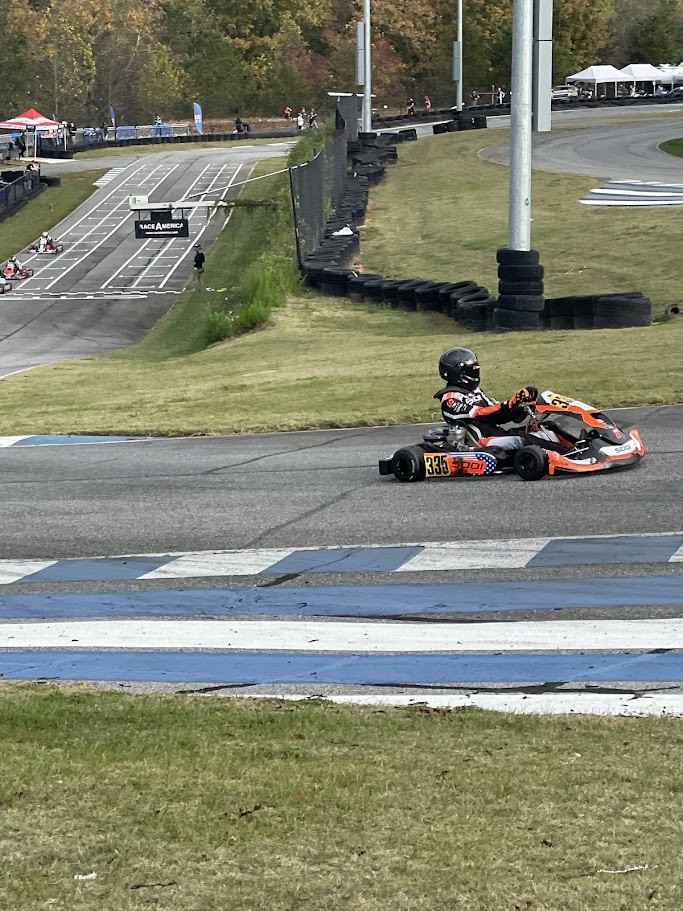
From the twists and turns of racing to the challenges of balancing education and competition, Christian is proving that sometimes, the road less traveled is the fastest one to success. If you are an aspiring driver, and want to learn more about Speed U’s program, be sure to visit www.skipstoneacademy.org for more details. And if you want to keep up with Christian’s journey, follow him on social media and stay tuned for more behind-the-scenes action!
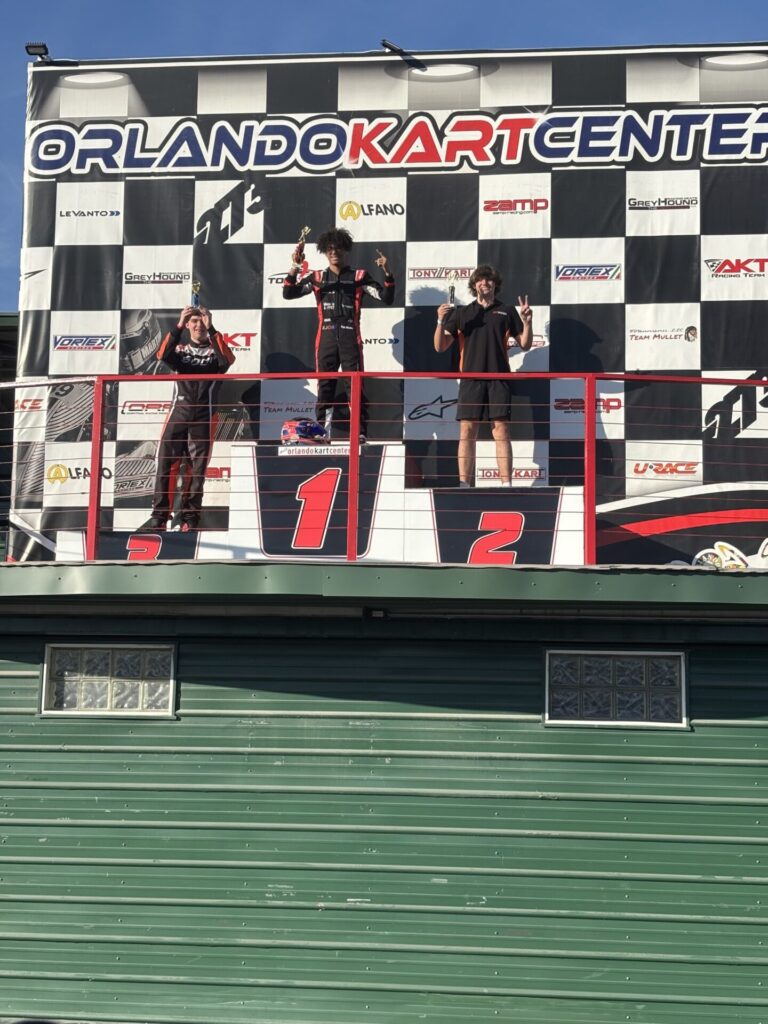
There's more to this story!
Be sure to check out the behind the scenes for this episode, filled with extras, bloopers, and other great moments not found in the final version. Become a Break/Fix VIP today by joining our Patreon.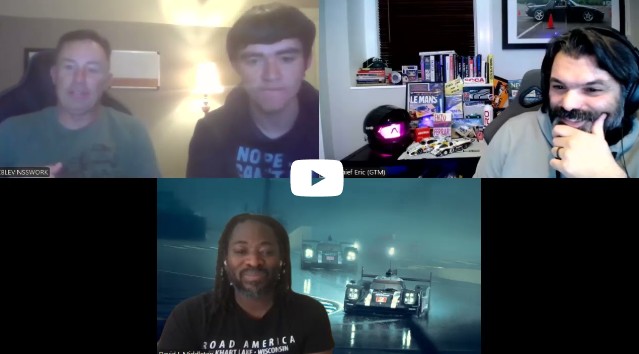
All of our BEHIND THE SCENES (BTS) Break/Fix episodes are raw and unedited, and expressly shared with the permission and consent of our guests.
Interested in SpeedU? (Skipstone Academy)
SPEED-U is fully online learning experience with high quality academic instruction using standards-based curriculum in a flexible program designed specifically for professional youth racers.
SPEED-U utilizes Accellus for some classes, which allows students to learn at their own pace and on their own schedule. When a student struggles, the system provides additional instruction and practice as needed. When a student excels, the system quickly moves them forward as they demonstrate mastery of each concept. The content includes:
- Video-based lessons
- Interactive practice problems
- Help videos for difficult concepts
- Reviews & exams
- Memorization drills
- Digital books
Student life will consist of weekly scheduled class Google Meet meetings with Synergy Prep Staff to make sure students are progressing and help them with any concerns, as well as oversight of their online assignments.
SpeedU is now accepting interest applications for the 2025-2026 school year. To ensure the quality of their program, they will limit enrollment to 50 students.
Learn more about MIE-racing
David L. Middleton, is the CEO and founder of Middleton Innovative Education (MIE), a new startup in the world of education looking to revolutionize the way we teach and engage students in science, technology, engineering and math or STEM.
Tune in everywhere you stream, download or listen!
 |  |  |
MIE’s mission is to propel students towards college, career and life success by creating a lasting impact through the power of racing, and as a result we aim to increase the interest in STEM related careers, especially for women, minorities and underprivileged youth who are statistically underrepresented in STEM fields. David wants the lessons he’s learned over the years to now be used as a lighthouse to inspire others to achieve their own dream and path towards success.


